Awesome Site in The Making
An amazing site is coming to this web address. Check back soon!

40+ Writing prompts for elementary students
Inspire writing growth in your youngest students. These writing prompts will have students imagining endless possibilities for their writing.
Journal Prompts for kids examples:
- What makes your school special?
- What would you like to invent?
- Have you ever broken something? What happened?
- What do you like to do when you're not at school?
- Have you ever had an imaginary friend?
- What is the best thing on the school playground? Why?
- Who is your favorite movie character?
- What are you really good at doing?
- What do you want to do better?
- What do you find annoying?
- How do you feel about talking in front of people?
- How do you feel about surprises?
- What superpower would you like to have?
- Write about something special you own.
- What is your favorite flavor of ice cream? What does it taste like?
- What will your grown-up life be like?
- What is the best art project or picture you have ever made?
- Imagine you invent a new kind of car in the future. What does it look like?
- How do kids learn to be kind?
- What happens when people can't work together?
- What makes a good friend?
- How do you cheer up a friend who is sick?
- What kind of gift is the best to give?
- What makes someone a good babysitter?
- Pick someone you love. What does that person look like?
- What if you could bring an animal to school?
- What if you had a time machine?
- What if you grew up to be taller than the school?
- What if you were the teacher?
- What if you were a baby again?
- What if cows could drive cars?
- What if you could only see the color yellow?
- What if the president were a kid?
- What if you had a friend who spoke a different language?
- What if you lived in a swimming pool?
- Once upon a time, a child woke up as a turtle….
- The car stopped in front of my house, and a clown got out….
- Three friends went on a trip to the moon. The best thing about it was….
- Once, I rode a unicorn to school….
- My teacher came to my house for dinner. We talked about….
- One day, my mom and dad switched jobs….
- I was walking in the woods, and someone called my name. I looked down and saw it was a frog….
- A boy had a dream he was a pirate and woke up on a pirate ship….
- The teacher's necklace is missing, and only one person knows what happened….
- A new kid comes to school and says he is from 1900….
Not every student is comfortable getting their thoughts down on paper
Read&Write is a digital literacy tool that helps students express their thoughts and opinions through words. Your students can use tools in Read&Write like Check It, Talk and Type, and the text and picture dictionaries to help develop their confidence in writing.
- Universal Design for Learning
- Math and STEM
- Inclusive Education
- Special Education
- Read&Write
- SpeechStream
- Inclusive Workplaces
- Neurodiverse Employees
- Creating Accessible Content
Resource center
- Impact Studies
- Customer Stories
Learn & Support
- Tech Support
- Certification Program
- Toolmatcher
- Accessibility Roadmap
No products in the cart.

100 Opinion Writing Prompts for Elementary Students

Teaching writing can often feel like an uphill battle, especially with opinion writing. Encouraging students to express their thoughts and ideas orally isn’t a challenge, but getting them to write down their ideas and support them with reasons takes some work. Trust me; I’ve been there too.
That’s why I have compiled a list of 100 Opinion Writing Prompts specifically for you! Whether new to teaching or looking for fresh ideas, this blog will make opinion writing engaging and enjoyable for you and your students!

In elementary school, students start to explore argumentative writing, where they learn to share their ideas and give good reasons to support them. They learn to back up their opinions with facts like detectives looking for clues!
This kind of writing teaches them to think carefully and explain why they believe in their ideas. It’s like having a friendly debate on the playground where one friend shares an opinion, and everyone else chimes in with their thoughts. Thinking about what they hear and talking about their ideas is a super skill for kids .
Tips for Teaching Opinion Writing with Prompts
Providing students with prompts that align with their interests, passions, and experiences will engage and motivate them to stay on topic and generate reasons and examples that they can add to their opinion-writing essays.
How can teachers choose the right opinion writing prompts that fit their students?
Strategies Teachers Can Use to Choose the Most Suitable Prompts for Their Students
Here are some tips for choosing the right prompts for students.
- Understand Student Interests: Know what topics your students are passionate about or curious to learn more about. This can be achieved through surveys, casual conversations, or observing their interactions and activities.
- Consider Age Appropriateness: Ensure the prompts suit the student’s age and maturity level. The content should be challenging enough to stimulate their thinking but not so difficult that it becomes frustrating.
- Align with Curriculum Goals: Choose prompts that complement and reinforce the learning objectives outlined in your curriculum. This ensures that the writing exercises are purposeful and contribute to overall educational goals.
- Promote Critical Thinking Skills: Select prompts that encourage students to think critically and analytically. Questions with no right or wrong answer but require reasoning and evidence are ideal.
- Encourage Creativity: Choose prompts that allow students to use their imagination and creativity. This not only makes the writing process more enjoyable but also helps in developing creative problem-solving skills.
- Diversify Topics: Rotate between different types of prompts. This variety keeps students engaged and helps develop a range of skills.
- Consider Current Events and Relevance: Incorporate prompts related to recent events or topics for opinion writing relevant to students’ lives. This makes the writing exercise more engaging and relatable.
- Incorporate Interdisciplinary Learning: Choose prompts that connect with other subjects like science, history, or art. This interdisciplinary approach can deepen students’ understanding and interest in these subjects.
- Adjust for Different Skill Levels: Have a range of prompts that cater to different writing abilities within your class. This helps in challenging advanced students while supporting those who need more guidance.
- Feedback and Reflection: Use student feedback on previous prompts to guide your future choices. Understanding what worked and what didn’t can help refine your selection process.
- Peer Suggestion Box: Allow students to contribute their prompt ideas. This gives them a sense of ownership and provides insight into what interests them.
- Balance Individual and Group Work: Choose some prompts that are suitable for group discussion and collaborative writing, as well as prompts for individual reflection and expression.
- Cultural Sensitivity and Inclusivity: Ensure that the prompts are culturally sensitive and inclusive, respecting the diverse backgrounds of your students.
- Link to Real-World Skills: Select prompts that help students develop real-world writing skills, such as letter writing, persuasive essays, or report writing.
- Seasonal and Thematic Prompts : Use seasonal themes (like holidays and seasons) or align with school events (like sports events and anniversaries) to make the prompts more engaging and timely.
Selecting the right opinion writing prompts for your students is an art that requires an understanding of their interests, skill levels, and the learning objectives outlined in your curriculum. The goal is to develop a love of writing in your students, helping them express their thoughts and opinions confidently.

100 Opinion Writing Prompts for Elementary Teachers
Here are 100 fun opinion writing ideas that your students will love! They will get your students’ creative juices flowing and help them perform better on their argumentative writing assignments.
- Should schools have uniforms? Students can argue for or against school uniforms, considering aspects like self-expression, equality, and convenience.
- Is homework necessary? This allows students to discuss the benefits and drawbacks of homework.
- Are pets better than toys? Students can compare the emotional connection with pets versus playing with toys.
- Should kids have cell phones? They can explore safety, distraction, and communication aspects.
- Is summer better than winter? Encourage students to compare seasons, focusing on activities, weather, and holidays.
- Should all kids learn to cook? Discuss the importance of cooking skills for independence and health.
- Are zoos good for animals? This prompts a discussion on animal welfare and conservation.
- Is it better to read a book or watch a movie? Compare the experiences of reading versus watching the same story.
- Should kids play sports? Consider physical health, teamwork, and time commitment.
- Is it important to learn a second language? Discuss cultural understanding and career benefits.
- Are video games good or bad? Explore creativity, problem-solving skills, and potential downsides.
- Should kids have a bedtime? Debate the importance of sleep against personal freedom.
- Is it better to be an only child? Consider the pros and cons of having siblings.
- Should junk food be banned in schools? Discuss health impacts and personal choices.
- Are superheroes better role models than real-life heroes? Compare fictional characters with actual people who make a difference.
- Is it better to travel or stay at home? Discuss experiences gained through travel versus comfort at home.
- Should schools have longer breaks? Balance academic needs with relaxation and play.
- Is it better to be smart or kind? Delve into the value of intelligence versus compassion.
- Should all kids play a musical instrument? Discuss cultural and cognitive benefits versus interests and time.
- Are indoor games better than outdoor games? Compare physical health, creativity, and social interaction.
- Should children help with household chores? Explore responsibility, teamwork, and skill development.
- Is it better to give or receive gifts? Discuss the joy of giving against the excitement of receiving.
- Should kids be allowed to vote on family decisions? Debate the importance of democracy versus the adult experience.
- Is it important to have a hobby? Consider personal growth, relaxation, and skill development.
- Should schools teach more about environmental protection? Argue the importance of education on sustainability.
- Is it better to be famous or rich? Discuss the pros and cons of fame and wealth.
- Should kids be allowed to choose their own bedtime? Weigh independence against the need for adequate sleep.
- Are team sports better than individual sports? Compare teamwork, individual achievement, and social aspects.
- Is it better to live in the city or the countryside? Contrast the environment, lifestyle, and opportunities.
- Should kids have a say in what they eat? Debate nutrition against personal taste and choice.
- Is watching TV a waste of time? Discuss educational content versus the potential for inactivity.
- Should students have homework on weekends? Weigh academic benefits against free time and relaxation.
- Are books better sources of knowledge than the Internet? Compare depth of information and reliability.
- Is it better to be an artist or a scientist? Discuss creativity versus logic and their impact on society.
- Should all students learn to play chess? Argue the cognitive and strategic benefits.
- Is it better to have many friends or a few close ones? Debate the value of quantity versus quality in friendships.
- Should there be more outdoor education? Discuss learning in natural environments versus traditional classrooms.
- Are cats better pets than dogs? Compare the characteristics and care requirements of each.
- Should kids participate in competitive exams? Weigh the pressure against the learning and opportunities.
- Is it important to celebrate birthdays? Discuss the significance of marking personal milestones.
- Should kids be allowed to use social media? Explore online safety, communication, and potential distractions.
- Is it better to be realistic or optimistic? Debate the benefits of practicality versus positive thinking.
- Should students have a longer school day? Balance academic improvement with time for other activities.
- Are board games better than video games? Compare social interaction, strategy, and screen time.
- Is it important to go to college? Discuss the value of higher education versus other paths.
- Should kids have chores every day? Weigh responsibility and skill-building against leisure time.
- Are robots a good invention? Discuss the benefits and potential drawbacks of automation.
- Is it better to live in the past or the present? Compare the advancements and simplicity of different times.
- Should kids learn about personal finance in school? Argue the importance of financial literacy from a young age.
- Are traditional games better than modern ones? Discuss the cultural significance and simplicity versus innovation.
- Should children have a say in their bedtime? Debate autonomy versus the need for parental guidance.
- Is it better to be famous or to have privacy? Weigh the allure of fame against the value of privacy.
- Should students be allowed to grade their teachers? Discuss the benefits and challenges of this feedback system.
- Is it important to have a best friend? Consider the value of a close, trusted relationship.
- Should kids learn about gardening in school? Argue the benefits of connecting with nature and understanding food sources.
- Is it better to have a strict teacher or a lenient one? Debate the impact of different teaching styles on learning.
- Should students wear school uniforms? Discuss the effects on individuality and school spirit.
- Are online games better than offline games? Compare the social aspects, accessibility, and potential for addiction.
- Is it important to learn about other cultures? Discuss the value of diversity and global understanding.
- Should kids have a daily reading time? Weigh the benefits of reading against other activities.
- Are animated movies better than live-action movies? Compare the creativity, realism, and appeal of each genre.
- Is it better to have a big family or a small one? Discuss the dynamics and relationships in different family sizes.
- Should kids be taught to meditate in school? Argue the benefits of mindfulness and stress reduction.
- Is it better to be a leader or a follower? Debate the roles and responsibilities of each.
- Should children have a say in what they learn at school? Discuss student interests versus curriculum requirements.
- Are fantasy books better than real-life stories? Compare escapism and creativity versus realism and relatability.
- Is it better to live in a house or an apartment? Weigh space, community, and lifestyle differences.
- Should kids be allowed to have exotic pets? Discuss the care, ethics, and safety of keeping unusual animals.
- Is it important to learn about space? Argue the value of understanding the universe and scientific exploration.
- Are electric cars better than gasoline cars? Consider environmental impact, technology, and practicality.
- Should students have snack breaks at school? Debate the benefits of energy replenishment versus potential distractions.
- Is it better to be early or exactly on time? Discuss punctuality, time management, and respect for others’ time.
- Should kids learn to swim? Argue the importance of safety, health, and recreation.
- Are reality shows better than scripted shows? Compare authenticity, entertainment value, and educational content.
- Is it important to celebrate national holidays? Discuss the significance of history, culture, and unity.
- Should children be taught coding in school? Weigh the future relevance against other educational priorities.
- Is it better to be tall or short? Discuss the advantages and challenges of both.
- Should kids help plan family vacations? Debate the value of their input versus adult decision-making.
- Are indoor pets better than outdoor pets? Consider safety, companionship, and lifestyle impact.
- Is it important to keep a diary? Argue the benefits of self-expression and memory keeping.
- Should there be a limit to screen time for kids? Discuss health, productivity, and balance with digital life.
- Is it better to do group projects or work alone? Compare collaboration skills and individual responsibility.
- Should kids be allowed to choose their school subjects? Weigh student interests against a balanced education.
- Are handmade gifts better than store-bought ones? Discuss the thoughtfulness , effort, and personalization.
- Is it important to have a clean room? Argue organization, hygiene, and personal responsibility.
- Should students have a say in school rules? Debate student involvement in governance versus adult expertise.
- Is it better to play an instrument or sing? Compare musical expression, skill development, and accessibility.
- Should kids be allowed to stay up late on weekends? Weigh relaxation and fun against the importance of a routine.
- Are public libraries still important? Discuss the role of libraries in the digital age for learning and community.
- Is it better to be honest or kind? Debate the balance between truth and compassion.
- Should students help plan school menus? Argue student preferences versus nutritional guidelines.
- Are superheroes more interesting than historical figures? Compare entertainment value and educational content.
- Is it important to learn about art in school? Discuss cultural appreciation, creativity, and critical thinking.
- Should kids ride bikes to school? Weigh health, environmental impact, and safety.
- Are science fiction books better than fantasy books? Compare the themes, creativity, and potential for learning.
- Is it better to play outside or inside? Discuss physical activity, imagination, and safety.
- Should students have a longer recess? Balance play and socialization with academic time.
- Are traditional toys better than electronic toys? Compare creativity, skill development, and engagement.
- Is it important to have a favorite color? Discuss personal expression and the psychology of preferences.
- Should schools start later in the day? Debate the impact on sleep, learning, and daily routine.
In addition to the above opinion writing prompts, consider other sources of ideas to motivate your reluctant writers, including mentor texts, picture prompts, and student’s experiences. Be sure that each prompt encourages critical thinking and self-expression, allowing students to explore their opinions and develop persuasive writing.
These thought-provoking prompts not only stimulate lively discussion among students but also help them hone their persuasive writing. Students learn to express their viewpoints clearly and constructively by engaging with these topics, creating a culture of open dialogue.
Opinion Writing Series
This post about opinion writing prompts compliments another blog post about how I teach our opinion writing unit . This instructional unit includes lesson plans in which students write about some of the above topics and learn how to structure their opinion writing to communicate their ideas best.
Here is a list of other blog posts about opinion writing:
- 7 Ways to Introduce Opinion Writing
- Picture Books to Teach Opinion Writing
- Teaching How to State an Opinion
- Teaching How to Supply Reasons
- Teaching How to Introduce the Opinion Writing
- Teaching How to Conclude the Opinion Writing
- Teaching Ideas to Solidify Students’ Understanding of Opinion Writing
Are you struggling to teach with writing prompts?
Writing prompts are helpful for elementary teachers to encourage their students to write creatively and learn the fundamentals of good writing, like grammar and structure.
This post will explore why teachers should use writing prompts, ways to incorporate them into lessons, and provide examples of prompts that teachers can use in their classrooms tomorrow!

Leave a Reply Cancel reply
Your email address will not be published. Required fields are marked *
Save my name, email, and website in this browser for the next time I comment.
- Our Mission
50 Writing Prompts for All Grade Levels
Sometimes students need a little push to activate their imaginations.

The collection of prompts below asks young writers to think through real or imagined events, their emotions, and a few wacky scenarios. Try out the ones you think will resonate most with your students.
As with all prompts, inform students that their answers should be rated G and that disclosing dangerous or illegal things they’re involved in will obligate you to file a report with the administration or school counselors. Finally, give students the option of writing “PERSONAL” above some entries that they don’t want anyone to read. We all need to let scraggly emotions run free in our prose sometimes.
If your class uses daybooks (an approach recommended in Thinking Out Loud: The Student Daybook as a Tool to Foster Learning ), wait for composition notebooks to go on sale at Target, the Dollar Store, or Walmart for $0.50 a piece. To organize the daybook, direct young writers to leave the first three pages blank and number and date each entry—adding these entries to a table of contents that they create as they work so they can return to specific entries later.
High School Prompts
- Should cameras on drones watch all public spaces to prevent crime, or is that a violation of privacy?
- Do Americans have it too easy? Why do you think that?
- What causes racism?
- The Bill and Melinda Gates Foundation hires you as a consultant to determine how best to use $20 billion to save the world. What’s your plan?
- What’s the worst thing about the internet?
- Would you rather be very beautiful or very smart? Explain.
- You can save one object before your house burns down. What is it? What makes that object important to you?
- How much control over your life do you have? What makes you say that?
- Describe your ideal life 15 years from now. What is something you can do every day to reach that goal?
- What would your friends say is your most lovable quality? Describe that quality.
- What is something scary that you would like to try? What makes it scary for you? How might you overcome that fear?
- What things do you conscientiously do to feed your brain?
- What are three of your most profound learning experiences? Where and when did they occur?
- By age 18, the average American has seen 200,000 acts of violence on TV, including 40,000 murders. What is it about television violence that is so compelling to people?
- Would you rather be loved or respected? Because?
- Does social media represent individuals authentically? Explain with examples.
- Imagine that it’s the last day of high school and you’ve been asked by a teacher to say a few words that summarize the events that have occurred over the last four years that are most meaningful to you. What do you say?
Middle School Prompts
- Which classmate would be the best to lead us through a zombie apocalypse? Why?
- What real-life situations would work out better for you if you were a different gender? Why?
- How can you tell when someone your age is feeling insecure? Are most people more insecure or anxious than they let on?
- If the internet were to crash forever, what would the benefits be for you? The drawbacks?
- Write a scene that features a) a classmate, b) $100 million, and c) magical shoes.
- What three features should your future house have? Why?
- If you starred in a television show about your life, what would the show be called? What genre would it be? (Examples: comedy, drama, thriller, romance, action-adventure, fantasy, superhero, soap opera, reality, game show, space adventure, Western, tragedy, etc.) Summarize the plot of an episode.
- In the future, what extreme sports will people be talking about?
- Is your ethnicity an important part of your identity? How so?
- You get to take one book, one food item, and one famous person (living or dead) to a deserted island. What and who do you take? Why?
- Write a powerfully supportive email to yourself 10 years from now. Send that email to yourself using FutureMe.org .
- You have been selected to be king or queen of your school. What are five rules that every kid should follow at your school? What should the punishment be for rule breakers?
- What do the five friends you hang out with most have in common? How are you most like them? How are you different from them?
- What contributes to someone becoming a bully? What can help stop someone from bullying?
- Do you make friends slowly or quickly? Describe how one of your important friendships evolved.
- Should we fear failure? Explain.
- If a wizard could tell you anything about your future, what would you most like to know?
- Do you believe in luck? Are you superstitious? How so? If not, why do you think some people are?
Elementary School Prompts
- I wish my teachers knew that . . .
- What’s the most beautiful person, place, or thing you’ve ever seen? Share what makes that person, place, or thing so special.
- Which is better, giant muscles or incredible speed? Why?
- What is your most difficult subject in school? Why is it difficult? What can you do to get better at that subject?
- Rewrite “Hansel and Gretel” from the witch’s perspective.
- Describe a scary situation that you’ve experienced.
- What is your first memory? Describe it.
- You wake up tomorrow with a silly superpower that makes you famous. What is that silly power? How does it lead to your becoming an international superstar?
- Are you a good loser? Explain.
- What are examples of things you want versus things you need?
- Last Friday, you were given one wish by a magical panda. You tried so hard to make the wish positive, but after the whacked-out events that unfolded over the weekend, you regret ever meeting that tricky panda. What did you ask for, and what happened?
- I wish my friends . . .
- Describe a routine that you often or always do (in the morning, when you get home, Friday nights, before a game, etc.).
- What things do all kids know that adults do not?
- What TV or movie characters do you wish were real? Why?
After they’ve finished an entry, ask students to read their work aloud or exchange daybooks for a read-around. If you give the entries written feedback, show that their work is respected by using a sticky note or scratch paper.
You might also incorporate background writing music one day a week—say on “Music Monday.” For some examples of music you might use in class, Pitchfork has an article called “ The 50 Best Ambient Albums of All Time .” My favorite album for composing is the Birdy soundtrack by Peter Gabriel—a good one for older kids. Other Edutopia staff and bloggers like writing to Coffitivity , Noisli , Lift Your Skinny Fists Like Antennas to Heaven by Godspeed You! Black Emperor, and Alcest’s Souvenirs d’un Autre Monde .
Don’t forget to write along with your students. Why should they have all the fun?
What are your students’ favorite writing prompts?

50 Writing Prompts For Elementary Students
What do you like more, reading or writing? Why? What do you like most about yourself? What superpower do you wish you had?
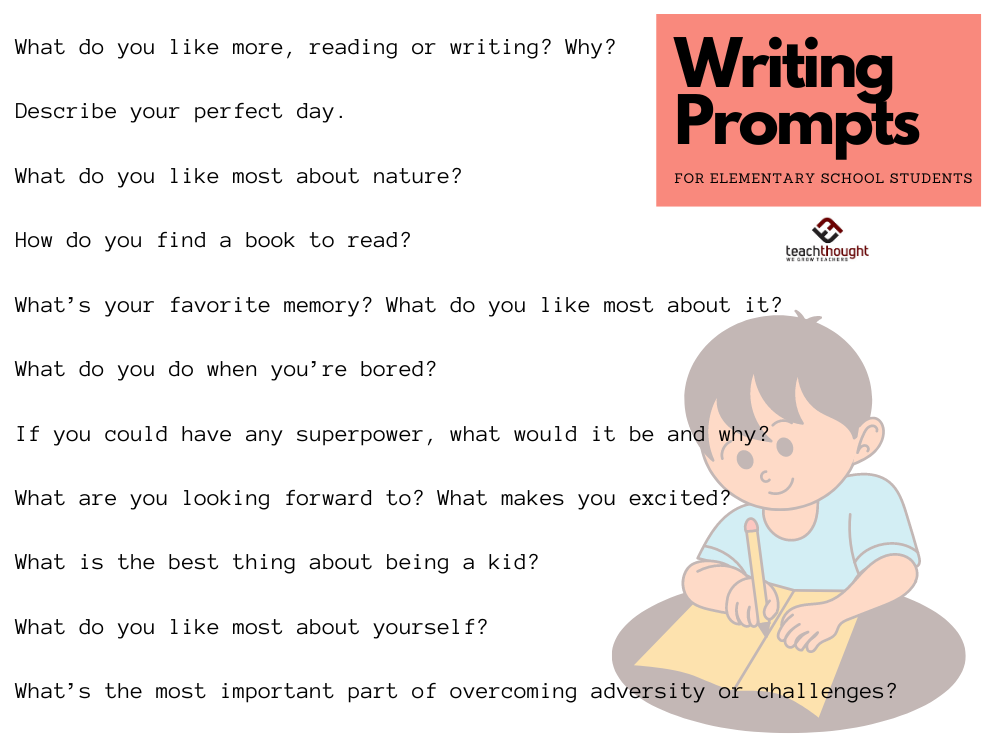
Basic Writing Prompts For Elementary Students
by TeachThought Staff
What do you like more, reading or writing? Why?
If you could have any superpower, what would it be and why?
Describe your perfect day.
What is your favorite outdoor activity and why?
If you could go on a trip anywhere worldwide, where would you go and why?
What do you like most about nature?
How do you find a book to read? Do you ask friends? Look through the shelves in the library? Another way?
Do thunderstorms scare you? If so, what do you do when one arrives? If not, what’s your favorite part of a storm?
Who is your hero, and why?
What’s your favorite movie?
If you could be any animal, which one would you choose and why?
If you could change one thing about the world, what would it be and why?
As a planet, how can we do a better job of taking care of the environment?
Do you like pencils or pens more? Why?
What’s your favorite memory? What do you like most about it?
What’s your least favorite chore to do? Favorite chore?
What is your favorite holiday and why?
What’s your favorite color?
What do you do when you’re bored?
Describe what your neighborhood looks like covered in snow.
What’s your favorite season? What do you like most about it? What do you like to do during this season?
What are you looking forward to? What makes you excited?
Describe your dream house.
If you could have any job in the world, what would it be and why?
Who is your best friend, and what do you like most about them?
What is your favorite hobby, and why?
If you could invent something, what would it be and why?
What’s something fun to do on a rainy day?
What do you want to learn more about? What interests you?
What do you want to be able to do one day? What skill?
What is your favorite thing to do on a sunny day?
Write a short story about a talking animal.
What is the best thing about being a kid?
What city or state do you want to visit and why?
Write a letter to your future self. What should they know or remember?
What is the most interesting place you have ever been to? or What is your favorite place in the world and why?
Write a story about a magical adventure.
If you could visit any planet in the solar system, which one would you choose and why?
What is your favorite food and why? What other foods do you like that may not be your favorite?
What country would like to visit and why?
Do you like sports? If so, do you play it or just watch it? What is your favorite sport, and why?
What are you good at? What would you like to become ‘better’ at?
Is there another language you’d like to learn? Which one and why?
Describe a recent dream you’ve had.
Write a letter to someone you appreciate or look up to.
How do you respond when you’re challenged? When something is difficult?
What would you do if you found a genie in a lamp?
Describe a day in your life as a superhero.
What is your favorite book and why?
What do you do when you get stuck or are unsure how to do something?
Write a short story about a friendship that develops between a human and an animal.
If you could invent a new game, what would it be, and how would you play it?
What is your favorite thing to do with your family?
What does love look and feel like?
Write a letter to your favorite fictional character.
What do you like most about yourself?
What’s the most important part of overcoming adversity or challenges?
TeachThought is an organization dedicated to innovation in education through the growth of outstanding teachers.

Choose Your Test
- Search Blogs By Category
- College Admissions
- AP and IB Exams
- GPA and Coursework
57 Fun Creative Writing Prompts for Kids
General Education

With many kids learning from home due to Covid-19, easy-to-organize educational activities for students are more important than ever. Writing helps improve students' creativity, communication skills, and ability to focus, among other benefits.
Whether you're a teacher, a parent now homeschooling, or a student looking for something new and interesting to write about, these writing prompts are for you. We've collected 57 writing prompts for students of various ages, from elementary school through high school. From spooky story writing prompts to debating how to improve schools, this article has writing prompts that will appeal to all students.
Tips for Using These Writing Prompts
What's the best way to use these creative writing prompts for kids? It depends on a lot of factors, including the student's age, current schooling structure, and their own interests and abilities. Here are some suggestions:
Use as a daily writing prompts exercise. You can assign one of these prompts at the beginning or end of the school day, as a way to prepare for the rest of the day or unwind after schoolwork.
Set up a quiet space to write. Many people have a hard enough time writing even with no distractions, and it can be nearly impossible to respond thoughtfully to a prompt if there's a television on, people talking, etc. Having a distraction-free space can help your student focus on the work at hand and produce their best writing.
Suggest an estimated writing length. Most of these journal writing prompts are designed to be answered both briefly or much more in depth. By giving a number of words/pages to aim for, you'll give your student a better idea of how detailed their response should be.
Consider having students handwrite their responses. Writing by hand can help students be more thoughtful about their responses because they'll typically write slower than they can type. It can also help students improve their handwriting skills.

57 Fun Writing Prompts for Kids
Below are over 50 journal topics for kids, organized into three categories: narrative writing prompts, fiction/creative writing prompts, and argumentative writing prompts for kids.
Narrative Writing Prompts for Kids
#1: What is your favorite holiday or holiday tradition?
#2: If you could go back in time for one day, which time period would you choose?
#3: If you could learn one thing about your future, what would it be? Or, if you prefer not to know anything, why would you make that choice?
#4: Pretend you're writing an autobiography and need to create a table of contents. What would you name each chapter?
#5: What is your earliest memory? Write every detail you can remember about it.
#6: If you had the power to change one thing about school, what would you change and why?
#7: Describe three goals you have for yourself.
#8: Imagine you are creating your dream restaurant. What kind of food would you serve, what would the menu look like, and how would the restaurant be decorated?
#9: If you could build your dream house, what would it look like? What rooms would it have? What would the yard be like?
#10: What is the bravest thing you've done in your life? Why did you make the choice you did? How did you feel during and after the situation?
#11: What is the funniest thing you've ever seen?
#12: What is your dream job?
#13: What is one thing you're really good at?
#14: Pretend you are a professional reviewer and write a review of a book you recently read or a TV show/movie you recently watched. How many stars would you give it? What did you like about it, and what didn't you like?
#15: Write about a time you did something kind for someone else. What did you do, how did it make you feel, and how did it make the person you helped feel?
#16: Imagine your life in ten years. What do you think you will be like? What will you be doing?
#17: Write about the craziest dream you've ever had.
#18: What would your perfect weekend look like? What things would you do? Who would you see? What would you eat?
#19: Do you like your name? If so, why? If not, what would you change it to?
#20: Make a list of your favorite activities for each season.
#21: Write about your least favorite chore. What don't you like about it? What would you invent to make the chore easier?
#22: What three pieces of advice would you give to your younger self?
#23: If you could be famous for anything, what would it be?
#24: If you could create a new law, what would it be? Do you think it would be hard to enforce?
#25: Write about a time you think one or both of your parents made a mistake. What did they do, and what do you think they should have done? Did they admit their mistake?
#26: How would your best friend describe you? How would you describe your best friend? (You can also have your friend do this prompt and read each other's responses.)

Fiction and Creative Writing Prompts for Kids
#27: Write a story about a character taking a submarine ride under the sea. What sort of things do you think they would see there? Would they be afraid or excited?
#28: Write a new chapter for your favorite book or new scene for your favorite movie. Which characters would be there, and what would they be doing?
#29: Invent a new pet. What would it look like, and what would you call it? What would it eat, and how would you care for it?
#30: Start a story with a lyric from a song.
#31: Pick something nearby (toy, pet, flower, etc.) and write a haiku about it. Bonus points if it rhymes!
#32: Write a story about a character who gets lost in the woods and discovers a mysterious person there.
#33: Write your own silly internet quiz.
#34: Choose an object in the house and describe it in as much detail as you can without saying what it is. Then, have a parent or sibling try to guess what you described.
#35: Write a scary story that includes: a spooky pumpkin patch, a vampire afraid of garlic, and a black cat.
#36: Do some people watching out your window. Write a story using one or more of them as the characters. Make up backstories and imagine what they're doing.
#37: Write a story about what you think your parents were like when they were younger.
#38: Your character survives a shipwreck and washes up on a mysterious island. What is on the island and how does (s)he get back home?
#39: Imagine you can choose to be any animal for a day. Which animal would you choose? What would you do?
#40: Write a poem about your favorite season.
#41: Imagine you are chosen for the first mission to Mars. What would you bring with you, and what do you think exploring the planet would be like?
#42: Write a sympathetic story from the point of view of the "bad guy." (Think fractured fairy tales like Wicked or The True Story of the 3 Little Pigs! , although the story doesn't have to be a fairy tale.)
#43: Imagine your pet gets a day to roam free before returning home. Where would it go, and what would it see?
#44: If you could have dinner with any three people (real or fictional), who would you choose and what would you talk about? What would you eat?
#45: Look through photographs, drawings, and paintings. Choose one and write a story about it, imagining where it is and the types of people/things there.
#46: Imagine aliens landed on earth. What would they look like, and how would they act? Would they be friendly or not?

Argumentative Writing Prompts for Kids
#47: Are there dangers of teenagers spending too much time on social media?
#48: Does homework actually help students learn?
#49: Should students doing e-learning this year get letter grades, pass/fail, or no grades?
#50: At what age should children get their own cell phone?
#51: Which is best: ebooks, audiobooks, or traditional print books?
#52: What's more important, PE classes or art classes?
#53: Which celebrity is the best role model for kids? Which is the worst?
#54: Should parents or teachers be able to ban certain books from schools?
#55: Which season is the best?
#56: Should students recite the Pledge of Allegiance in school?
#57: Should students go to school year-round and have shorter breaks throughout the year rather than one long summer vacation?

What's Next?
Also looking for science activities for kids? Check out our 37 science experiments for kids that you can do at home!
Want to make some slime? We tell you how to make slimes without borax and without glue as well as how to craft the ultimate super slime .
Pipe cleaners can provide endless craft ideas. Read our guide for simple instructions for 31 fun pipe cleaner crafts for kids.
Trending Now
How to Get Into Harvard and the Ivy League
How to Get a Perfect 4.0 GPA
How to Write an Amazing College Essay
What Exactly Are Colleges Looking For?
ACT vs. SAT: Which Test Should You Take?
When should you take the SAT or ACT?
Get Your Free

Find Your Target SAT Score
Free Complete Official SAT Practice Tests
How to Get a Perfect SAT Score, by an Expert Full Scorer
Score 800 on SAT Math
Score 800 on SAT Reading and Writing
How to Improve Your Low SAT Score
Score 600 on SAT Math
Score 600 on SAT Reading and Writing
Find Your Target ACT Score
Complete Official Free ACT Practice Tests
How to Get a Perfect ACT Score, by a 36 Full Scorer
Get a 36 on ACT English
Get a 36 on ACT Math
Get a 36 on ACT Reading
Get a 36 on ACT Science
How to Improve Your Low ACT Score
Get a 24 on ACT English
Get a 24 on ACT Math
Get a 24 on ACT Reading
Get a 24 on ACT Science
Stay Informed
Get the latest articles and test prep tips!

Christine graduated from Michigan State University with degrees in Environmental Biology and Geography and received her Master's from Duke University. In high school she scored in the 99th percentile on the SAT and was named a National Merit Finalist. She has taught English and biology in several countries.
Ask a Question Below
Have any questions about this article or other topics? Ask below and we'll reply!
49 Opinion Writing Prompts for Students
- Lesson Plans
- Grading Students for Assessment
- Becoming A Teacher
- Assessments & Tests
- Elementary Education
- Special Education
- Homeschooling
:max_bytes(150000):strip_icc():format(webp)/squareheadshot-5b6da9aec9e77c0050a6e8a5.jpg)
One of the most common essay types is the opinion, or persuasive, essay. In an opinion essay , the writer states a point of view, then provides facts and reasoned arguments to support that viewpoint. The goal of the essay is to convince the reader to share the writer’s opinion.
Students aren't always aware of how many strong opinions they already hold. Use the following opinion writing prompts to inspire them to start thinking and writing persuasively.
Prompts About School and Sports
School- and sports-related topics often elicit strong opinions in students. Use these writing prompts to kick off the brainstorming process.
- Ch-ch-ch-changes . What is one thing about your school that needs to change? Is bullying an issue? Do students need longer breaks or a dress code? Choose one vital issue that needs to change and convince school leaders to make it happen.
- Special guest. Your school is trying to decide on a famous person to give a speech or presentation to students. Who do you think they should choose? Write an essay to convince your principal.
- Oxford or bust. Is the Oxford comma essential or obsolete?
- Scribble scrabble. Do students still need to learn cursive handwriting?
- Co-ed conflict. Would students perform better if more schools were single-gender rather than co-ed? Why or why not?
- Participation awards. Should there be winners and losers in sports, or is participation the ultimate goal?
- Homework overload. Write an essay to convince your teacher to assign less homework.
- Sports. Which sport (or team) is the best? What makes it better than the others?
- No slacking . Write an essay persuading a fellow student to do their homework.
- Class trip. This year, students get to vote on where to go for a class trip. Write an essay convincing your fellow students to vote for the place you’d like to go.
- Superlatives. Which would you rather be: a top student, a talented athlete, or an accomplished artist?
- Virtual athletes . Video games competitions are often aired on TV and treated like sports competitions. Should video games be considered sports?
- Class debate. Should classes that students may not use or that don’t interest them (such as physical education or foreign language) be required?
Prompts About Relationships
Friendships, dating, and other relationships can be both rewarding and exasperating. These writing prompts about relationships will help students explore their feelings about both the positive and the negative moments.
- Snitch. Your best friend tells you about his plan to cheat on a test. Should you tell an adult? Why or why not?
- Give it a chance. Your best friend is convinced that she would hate your favorite book, even though she's never read it. Convince her to read it.
- Friendships vs. relationships. Are friendships or romantic relationships more important in life? Why?
- Driving age. What age do kids start driving in your state? Is that age too old, too young, or just right? Why?
- Truth or consequences. Your best friend asks your opinion about something, but you know that a truthful answer will hurt her feelings. What do you do?
- Who chooses? Your best friend is visiting, and you want to watch TV together, but his favorite show is at the same time as your favorite show. Convince him that your show is a better choice.
- Fun times. What is the most fun thing you and your best friend have ever experienced together? Why does it deserve the top spot?
- Dating. Are long-term dating relationships good or bad for teens?
- New friends. You want to spend time with a new student at school, but your best friend is jealous. Convince your friend of the importance of including the newcomer.
- Be mine. Is Valentine’s Day worthwhile or just a scheme for the greeting card and chocolate industry to make more money?
- Debbie Downer. Should you cut ties with friends or relatives who are always negative?
- He loves me not. Is it really better to have loved and lost than never to have loved at all?
- Elders. Should you respect your elders merely because they are older, or is respect something that must be earned?
Prompts About Family, Pets, and Leisure Time
The following writing prompts related to family, furry friends, and free time will help students reflect on preferences, ethics, and integrity.
- Self-reflection. This time, you're the one who needs convincing! Write an essay to persuade yourself to start a healthy habit (or kick a bad habit).
- Paper wars. Should toilet paper hang with the loose end resting on the top of the roll or hanging from the bottom?
- Movie vs. book. Choose a book that has been made into a movie. Which version is better, and why?
- Weekend wanderings . Do you prefer to stay home on the weekends or get out and do things around town? Write an essay to convince your parents to let you do what you prefer this weekend.
- Sweepstakes. A travel agency is hosting an essay contest to give away an all-expenses-paid trip to the one place in the world you’d most love to visit. Craft a winning essay that convinces them they need to choose you.
- Zoo debate. Is it ethical to keep animals in zoos? Why or why not?
- Presence of pets. Should there be limits on the types of places pets can go (e.g. airplanes or restaurants)? Why or why not?
- Inspiring stories. What is the most inspiring book you’ve ever read? Why is it so inspiring?
- Dollar discovery. You find a $20 bill in the parking lot of a crowded store. Is it okay to keep it, or should you turn it in to customer service?
- Vacation day. What is the very best way to spend an unexpected day off from school and why is it the best?
- Digital or print? Is it better to read books in print or digitally? Why?
Prompts About Society and Technology
The people and technology around us have a significant impact on our lives. These writing prompts encourage students to consider the effect that society and technological advances have on our day-to-day lives.
- Reverse technology. Pick one technological advancement that you think the world would be better off without. Explain your reasoning and persuade the reader.
- Out of this world . Do aliens exist? Why or why not?
- Social media. Is social media good or bad for society? Why?
- Emoji. Has the use of emoji stunted our ability to express ourselves in writing, or does it help us identify our emotions more precisely?
- Auto safety. Have advancements like self-driving cars, blind spot indicators, and lane departure warning systems made driving safer, or have they just made drivers less attentive?
- Exploration Mars. Write a letter to Elon Musk convincing him that you should be part of a colony to Mars.
- Fundraisers. Is it okay for kids to stand outside stores and ask shoppers for money for their sports teams, clubs, or band? Why or why not?
- Inventions. What is the greatest invention ever made? Why is it the best?
- Important cause. In your opinion, what global problem or issue deserves more attention than it currently receives? Why should more time and money be invested in this cause?
- Minimalism. Does living a minimalist lifestyle make for a happier life? Why or why not?
- Gaming gains. Are video games generally a positive or a negative influence? Why?
- Rose-colored glasses. Is the current decade the best era in history? Why or why not?
- Paper or plastic. Should plastic bags be outlawed?
- 100 Persuasive Essay Topics
- 50 Argumentative Essay Topics
- 100 Persuasive Speech Topics for Students
- Engaging Writing Prompts for 3rd Graders
- Discussion Questions to Use in English Conversation
- 50 Great Topics for a Process Analysis Essay
- Writing Prompts for 5th Grade
- April Writing Prompts
- Striking Out: Sample Common Application Essay
- 4th Grade Writing Prompts
- Writing Prompts for 7th Grade
- Expressing Opinions of Best and Worst
- Understand Your Class With This Fun Survey for ESL/EFL Learners
- Writing Prompts for Elementary School Students
- First Grade Writing Prompts
- How to Write a Successful Personal Statement for Graduate School
Squarehead Teachers
Free teacher stuff to get your elementary classroom all squared away.

65 Expository Prompts for Kids

1. Write about what you think the world will be like in 100 years.
2. We are learning all the time. Write about something you have learned recently and how it has affected you.
3. You have been asked by your principal to recommend one course which will help you prepare for the job you want in the future. It could be a course your school is already offering or a new course. Write an essay to explain to your principal the course you would recommend. Be sure to give the reasons for your suggestion.
4. Explain the main reasons why you think students drop out of school.
5. Talk about your favorite music and why you like it.
6. Think of your favorite year in school. Explain why it was your favorite year.
7. Friends are important, but everyone has a different opinion of what makes a good friend. Explain what, in your opinion, makes a good friend.
8. Some teachers are special. Without giving any names, explain why one particular teacher in your life was special.
9. If you could change one thing about your school, what would you change? Explain why.
10. We all get angry at times, but different people react in different ways. Some people show their anger openly, and some hide it within themselves. Explain and describe what you do when you get mad.
11. Friends sometimes experience conflicts. Explain why this happens.
12. If someone were new to your town, explain to him/her the highlights.
13. If you could make changes to your school lunchroom, what would you do?
14. Most people like one particular animal more than others. Explain why your favorite animal is your favorite animal.
15. Most people remember one day that really was special. Think about a special day you have had and write an essay explaining why that day was so special.
16. Your generation faces many problems. Identify one of these problems that you feel is the most important, explain it, and propose some possible solutions to the problem.
17. Much has been written about the negative effects of television on young people. Are all television shows bad for children? Write an essay describing a show you feel has a positive impact on today’s teens and explain how the show could be helpful.
18. Rules are important in our daily lives. We have rules for driving, rules for studying, and even rules for playing. Think about the rules you have in your school. What three rules should every school have? Write an essay explaining to the reader the three rules you selected. Give clear reasons why each one is needed.
19. Games are fun and often teach us something as well. Think about your favorite game. Write a paper telling about your favorite game. Explain to the reader your reasons for enjoying it.
20. Suppose you have been appointed to a neighborhood improvement committee. You must make recommendations on ways to make your neighborhood a better place to live. Think about some changes you would like to make in your neighborhood. Write an essay to inform your reader of changes you would recommend to improve your neighborhood and why these changes are important.
21. If you could choose any animal for a class pet, what would you choose and why?
22. What is your favorite time of the year? Explain why this is your favorite time.
23. Everyone has something or someone that is important to him/her. Pick an object, a person, or a feeling that is important to you and explain why it is so important in your life.
24. Eating healthy foods is very important. Write an essay explaining why it is important to eat healthy foods.
25. Explain why it is important to learn to read.
26. Think back to when you were little and had a favorite toy. Explain why you liked this particular toy.
27. Everyone has chores to do. Explain why you do the job or chore you have.
28. If you could be any other person for a day, who would you be? Explain why you would like to be that person for a day.
29. We are increasingly worried about our environment. Write an essay explaining about one environmental problem you think is important and propose some possible solutions to the problem.
30. Suggest one change that you think can make this country better.
31. If you had a time machine and could go to any time in the past or future, where you go? Explain why you chose that particular time.
32. Everyone has responsibilities. Write a paper explaining a responsibility you have now or will have in the future and why you shoulder that responsibility.
33. Write an essay explaining whether you prefer a big city or small town in which to live and why you prefer it.
34. Your class is making a box to be seen in 2096. Write an essay explaining the one thing you put in that box and why.
35. Think of your favorite year in school. Now write an essay explaining why it was your favorite year.
36. Most adults in this world have a job of some sort. Think of the ideal job for you when you complete your schooling. Now, think of some reasons why this would be your ideal job. Write an essay to explain why this is your ideal job.
37. Schools do not offer all the elective courses (like art and music) that students would like to take. Think of one elective course you want to take that your school does not offer at this time. Think of some reasons why you think this course should be offered. Now, write an essay explaining why you think that this particular elective should be offered in your school.
38. Everyone has a book that he or she enjoyed reading, whether it be a book recently read or one read as a small child. Think of one book you have read that you really enjoyed. Maybe it was your favorite book when you were little. Maybe it’s one you read recently. Think of some reasons why you liked that book. Now, write an essay explaining why you really like your favorite book.
39. Many writers, scientists, and politicians have a view of what the world will be like 50 years from now. What do you think the world will be like by the time you are in your 60’s? Think of the future and the direction you think the world is headed. Write an essay explaining what you believe the world will be like 50 years from now.
40. Many students drop out of school before they graduate from high school. Think of some reasons why you think these students do not finish high school. Now, write an essay explaining why you think students drop out of school.
Alternative for younger students: Many students do not do their work in school and then later often quit school before they graduate. Think of some reasons why you think these students do not do their work and get bad grades. Now, write an essay explaining why you think these students do not work in school and often quit school before graduating.
41.High school English classes require students to read Shakespeare and other classics. Some students object to this practice. Think of some reasons why you think the state requires that Shakespeare and the classics be taught in high school English. Now, write an essay explaining why you think Shakespeare and the classics are required.
Alternative for younger students: In school, students must read classic books that the teacher picks. Some students do not like to be told what to read. They would rather pick their own books. Think of some reasons why your teachers require these classic books that are so famous. Think of some that your teacher has read to you or that you have read yourself. Now, write an essay explaining why you think the teachers insist that students read and listen to the famous classics.
42. Imagine that time travel to the past was possible. Think of where and when you would like to go for a visit. Write an essay telling where and when you would go in the past and explain why you choose to go there.
43. Imagine that you had no TV or radio for one week. Think of some activities that you can do instead to keep you busy and out of trouble. Write an essay to explain what you can do to keep occupied in a week of no TV or radio.
Or, alternatively, if your students are having trouble with this type of essay: Imagine that you had no TV or radio for one week. Think of one activity that you would like to do instead to keep you busy and out of trouble. Write an essay explaining one activity to replace the TV and radio for that week.
44. Teenagers (children) are faced with many problems today. School, home, society, peers all complicate your lives. Think of one problem that really bothers you. Now, think of some solutions to that problem that might make it easier to bear. Write an essay offering solutions to your worst problem.
45. Many teenagers (children) complain that adults expect too much of them. Many adults think that teenagers (children) do not help out enough at home, at school, or in society doing volunteer work. What do you think? Do adults expect too much of you? Think of some reasons to support your answer. Now, write an essay explaining whether or not you think adults expect too much of you.
46. Each year many teenagers are killed by driving under the influence of alcohol or by being in a car driven by another teen who has had too much alcohol. How can the number of alcohol-related deaths be reduced? Think of some solutions you and your friends could implement to solve this problem. What do you think would work to reduce the deaths? Now, write an essay proposing some solutions to help stop teenagers from risking their lives and driving under the influence of alcohol.
Alternative for younger students: Each year many teenagers are killed by driving under the influence of alcohol or by being in a car driven by another teen who has had too much alcohol. Think of what you and your friends, as younger persons who cannot yet drive, can do to keep your older brothers and sisters and friends from drinking and driving when drunk. Write an essay explaining your ideas to keep these teens out of the car if they drink.
47. Pollution, excessive garbage, toxic and industrial waste, using up nonreplaceable resources are all problems facing our environment. Think of one particular environmental problem that you believe could be solved. Now think of some possible solutions to that problem. Write an essay proposing and explaining your solutions to the environmental problem you chose.
48. We all have a place where we can imagine or go where we relax, let our troubles disappear, and have a good time. For some it is a place far away, and for others it is a place close to home. Think of your favorite place where you can feel an escape from the hassles of your world, a place you love to be, your favorite place. Now, write an essay explaining why this place is your favorite.
49. Everyone has something they do to relax and have fun. Some like to read; others prefer sports; still others like to chat with friends. What is your favorite thing to do to relax and have fun? Think of why you enjoy this activity so much. Now, write an essay explaining why your favorite activity is your preferred way to relax and have fun.
50. In the past few years, there have been more and more incidents of violence reported on school campuses. In fact, there have been many reports of violence even at the kindergarten level! What do you think is the cause of this rise in violence? Think of some possible reasons. Write an essay explaining why you think there have been more incidents of violence in schools in recent years.
51. By the time we reach high school, at least one teacher has made an impact in our lives. Think of a teacher you have had who influenced you and really helped you to learn and to mature. Think of some reasons why this teacher made such a positive impact on your life. Now, without mentioning the teacher’s name (use Mr. or Ms. X),explain why this teacher has had such a positive influence in your life.
52. Many kids hear their parents and grandparents talk about “the good old days.” Is this just a figment (imaginary thought) in older people’s minds as they remember their youth? Was life really better twenty or forty years ago? What do you think of this statement? Is life for teens harder now or when your parents and grandparents were young? Now, write an essay explaining your answer to this question.
53. Philosophers have written books and books about the meaning of life. Each one is different. What is your philosophy of life? What is life all about? Decide what you think are the most important elements that make us human, that are the ideas (philosophies) of the way you run your life. Write an essay explaining your philosophy of life.
Alternative for younger students: There are many books that talk about the meaning of life. Your teacher talks about living a “good” life. What do you think are the most important things to remember to follow in the years to come? What do you think are the most important things to do in your life that will lead to your happiness? Now, write an essay explaining what will make life good and meaningful for you.
54. We all have different personalities, different ways of dealing with life, different points of view. What are the main elements of your personality? What kind of a person are you? What are you really like inside? Write an essay explaining your personality to your reader.
55. Life is filled with conflicts, conflicts of interest, conflicts of opinion, conflicts of life styles, etc. Most good novels have some sort of conflict in them to add to the interest. Resolving that conflict is what the novel is about. Think about some of the conflicts in your life. Now think how you resolve those conflicts. Write an essay to explain how you usually resolve conflicts. What is your method?
56. Everyone, no matter how young, has a year in his or her life that was not so good. Think of the worst year of your life. Think of reasons why it was your worst year. Write an essay explaining why that particular year was the worst year of your life. (Or conversely)
57. Your school (the United States, your state, etc.) is not perfect. No matter how good something is, there are always ways to make it better. Think of one problem your school (the United States, your state, etc.) has that might be improved with some clever plans. Now, think of some solutions, some ways to make that improvement. Write an essay explaining your solutions to the problem.
58. Imagine that going to the future was possible. Think how far ahead into the future you would like to visit. Think about your reasons why you would like to choose that particular time. Write an essay telling how far into the future you would like to go and explain why you chose that particular time.
59. When we are young, we play games—board games, imaginary games, sports games. Think of some reasons why you really liked this game. Now, write an essay explaining why this game was your favorite as a younger child.
60. Medical studies have shown that exercise is a necessary part of our daily routine. What do you think? Do you exercise? Think about some reasons why you exercise. Exercising is important. Write an essay why it is important to exercise regularly.
61. We consider certain people (real or made up) to be our heroes. Think about a real or made-up person and why he or she is your hero. Now write an essay explaining why that person is your hero.
62. Imagine if you could do anything you wanted for an entire week. Pick one thing you would like to do that week of freedom. Now write an essay to explain why you chose to do that one thing in a week in which you could have done anything you wanted.
63. You have been told for years by your parents and teachers to eat healthy foods instead of junk food. Think of some reasons why eating healthy foods is important. Now write an essay explaining why eating healthy foods is important.
64. At school, at work, and at play we have to work in teams in order to achieve our goals. Think of some attributes that make a good team player whether it be in a sport, at work, or at school when working in groups. Now write an essay to explain what makes a person a good team player.
65. Your parents and teachers insist that respect for others is very important. Think of some reasons why this might be important. Now write an essay explaining why respect for other people is important.
Share this:
- Click to share on Pinterest (Opens in new window)
- Click to email a link to a friend (Opens in new window)
- Click to share on Facebook (Opens in new window)
- Click to share on Twitter (Opens in new window)
- Click to share on Tumblr (Opens in new window)
- Click to print (Opens in new window)
- Click to share on LinkedIn (Opens in new window)
- Click to share on Reddit (Opens in new window)
- Click to share on Pocket (Opens in new window)
11 thoughts on “ 65 Expository Prompts for Kids ”
Thank you but i would do something more fun for a little one.
these are fun
I think this is pretty helpful
Please leave a comment (No sign-in required). Thanks! Cancel reply
This site uses Akismet to reduce spam. Learn how your comment data is processed .
- Already have a WordPress.com account? Log in now.
- Subscribe Subscribed
- Copy shortlink
- Report this content
- View post in Reader
- Manage subscriptions
- Collapse this bar
- Occupational Therapy
- Parent Support
- Special Education
- Coloring Pages
- Web Stories
- Teacherpreneur
- Services Policy


20 Argumentative Essay Topics for Students
What is an argument essay.
An argument essay uses logic and reasoning to defend a position or point of view. In an argument essay, research, evidence, and examples are used to convince the reader to consider a different point of view. A strong argument essay also acknowledges the opposing viewpoint. This is known as the counterargument. Ultimately, the counterargument is disputed with evidence in an attempt to convince the reader to support the writer’s initial claim.
Argument Writing vs. Opinion Writing
It’s easy to confuse opinion writing and argument writing. Both types of writing require students to take a stand and support it with reasons and evidence. To keep things straight, think of opinion writing as the stepping stone to argument writing. Most states require students make the switch from opinion writing to argument writing in 5th or 6th grade.
-Opinion writing builds the foundational skill set for argument writing. Opinion writing requires students to take a stand and support their choice with clear and relevant reasons. The purpose of opinion writing is to share a point of view.
-Argument writing takes the same process a step further. Argument writing requires students to make a claim and support it with research, evidence, and logic. The purpose of argument writing is to convince the reader to consider a different point of view.
Argument Essay Topics
Should playing video games be considered a sport? Is online school better than in-person school? Should graffiti be considered art? Should college be free? Do we still need libraries? Is physical education important? Is homework necessary? Should cellphones be allowed in school? Which branch of government is the most important?
Should pets be allowed on airplanes? Should internet access be free? Should the Pledge of Allegiance be optional? Are dogs better than cats? Is math the most important school subject? Should the school day be shorter? Are Macs better than PCs? Is social media harmful for kids? Should schools have surveillance cameras in classrooms? Should all people be vegetarians? Should plastic bottles be banned?
Questions to Consider When Picking an Argument Essay Topic:
- Do you feel strongly about the topic?
- Does the topic have opposing viewpoints?
- Do you have solid reasons to support your argument?
- Can you find valid evidence to support your reasons?
Argumentative Writing Unit for Grades 5-8
Click here to see the step-by-step process for writing argumentative essay. Examples and tips for students are included!
Introduce argumentative writing to all levels of learners with this comprehensive unit! Everything you need to differentiate and scaffold instruction is included with this printable and digital argument writing lesson! Use this bundle of step-by-step materials to guide students through every paragraph and element of argument writing. Make it easy for all students to plan, draft, and revise their essays.
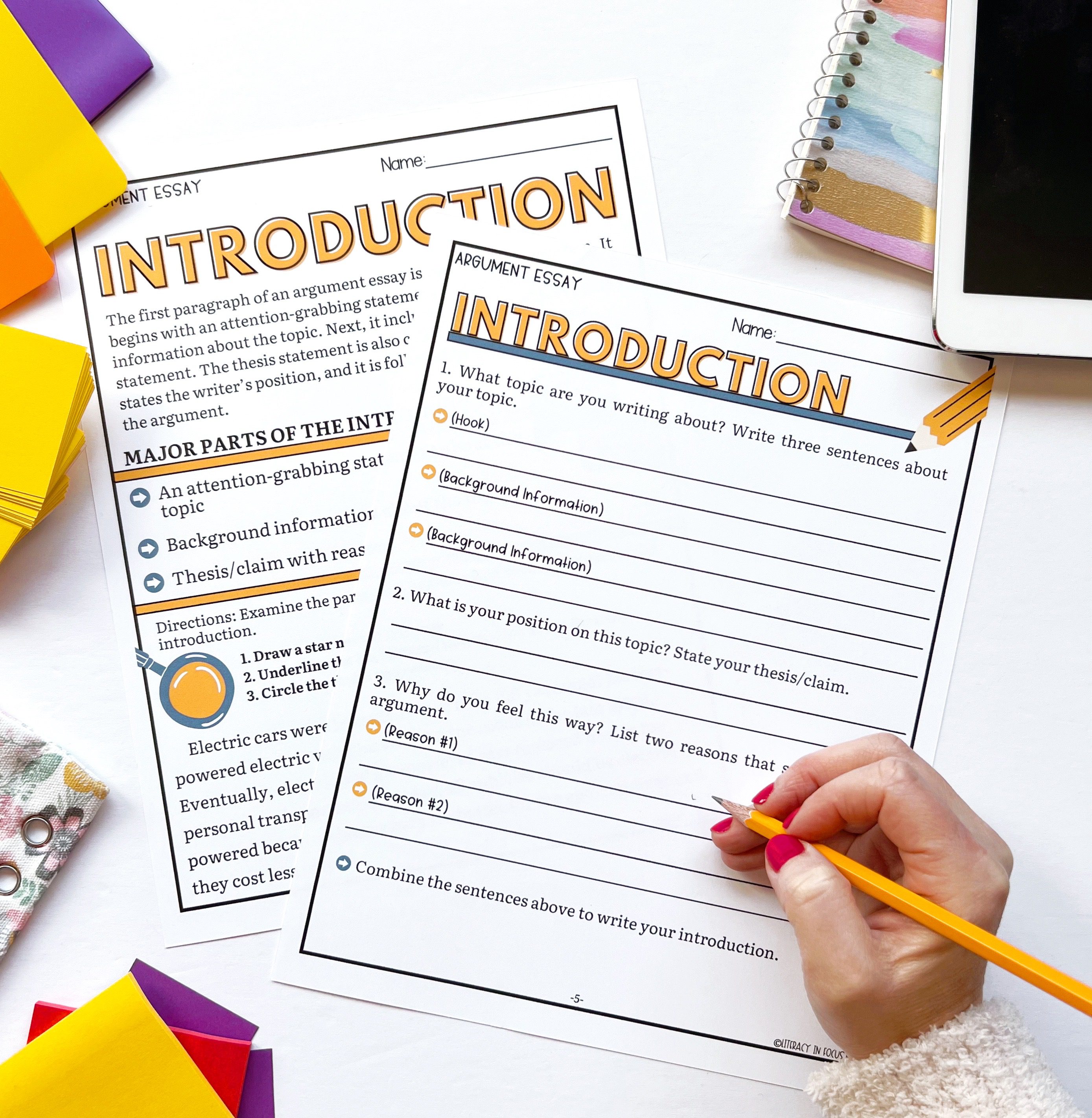
- Grades 6-12
- School Leaders
Easy Classroom Set Up With our Free Email Course!

137 Intriguing Cause & Effect Essay Topics for Students
Teach critical thinking, logic, and the art of persuasion.
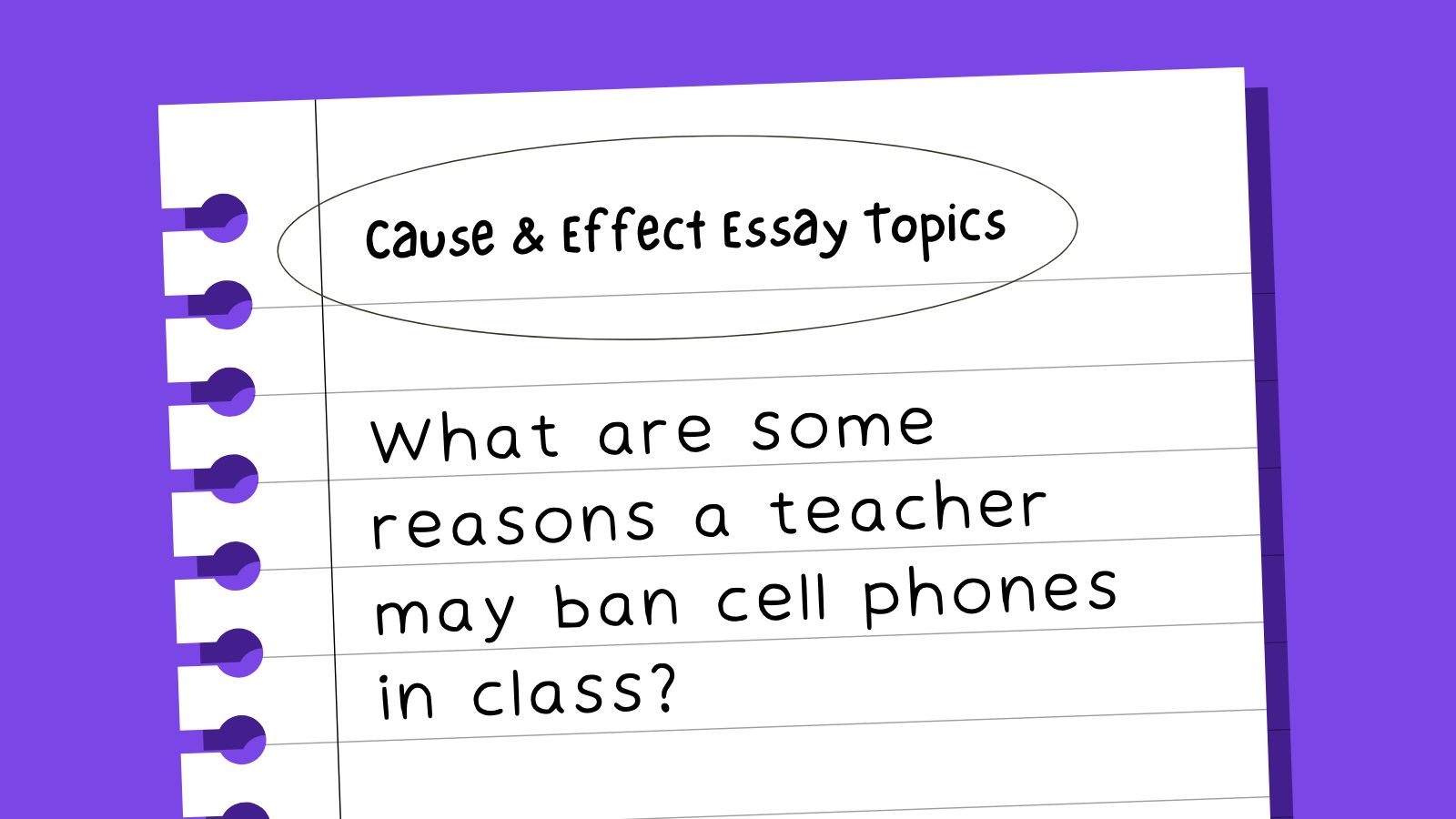
Cause-and-effect essays aren’t just a way to help students strengthen their writing skills. They’ll also learn critical thinking, logic, and the art of persuasion. In addition, they teach students to demonstrate how one thing directly influences another. Coming up with engaging cause-and-effect essay topics can be challenging, but we have you covered. This list of ideas includes a variety of topics that range from social and cultural movements to mental health and the environment.
Science and Environment Cause & Effect Essay Topics
- Describe the effect of urbanization on the environment.
- What is the impact of air pollution on health?
- What are the causes and consequences of plastics on marine life?
- What is the impact of rising sea temperatures on fish and marine life?
- Describe the impact of human behavior on global warming.
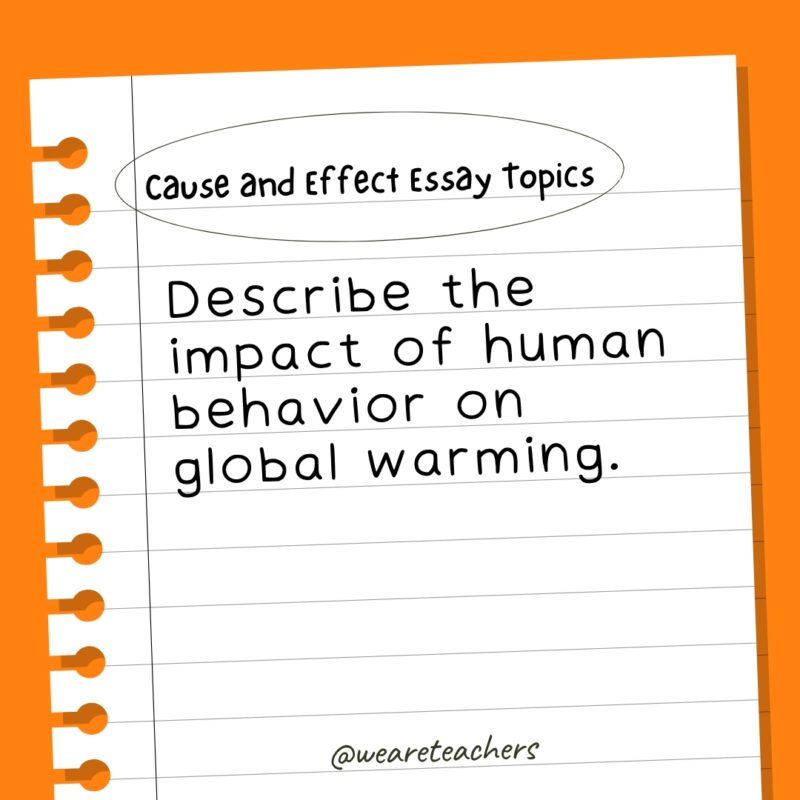
- What is the effect of social media on environmentalism?
- What causes volcanic eruptions?
- What causes trees to die?
- What are the effects of gravity?
- Why are plants green?
- Why do trees shed their leaves?
- What causes a species to become endangered?
- What are some of the causes of animals losing their habitats?
- Describe the effect of overpopulation on the environment.
- What are the effects of famine on human population?
- What are the causes and effects of Antarctica floods?
- What are the effects of pollution on the ocean?
- What effect do cars have on the environment?
- Why is it important to manage wildfires?
- What has been the impact of DNA on crime scene processing?
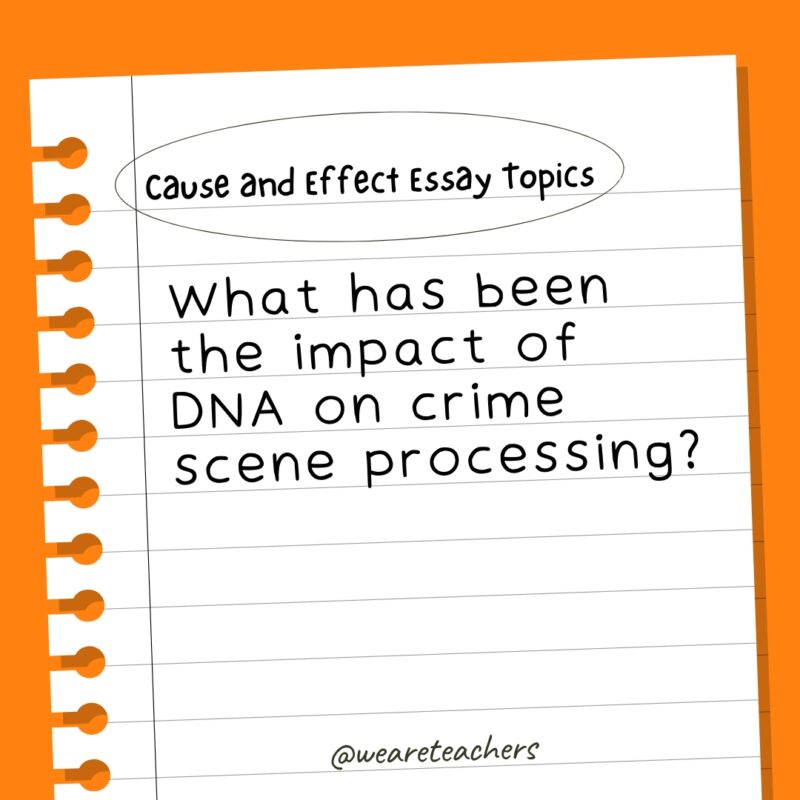
- What are the impacts of deforestation in Brazil?
- What are the effects of GMO foods on human health?
- What are the impacts of immunizations on human health?
Technology and Social Media Cause & Effect Essay Topics
- What are the effects of social media on adolescent development?
- How does technology affect productivity?
- What are the effects of video games on childhood development?
- How do cell phones affect human relationships?
- What are some reasons a teacher might ban cell phones from class?
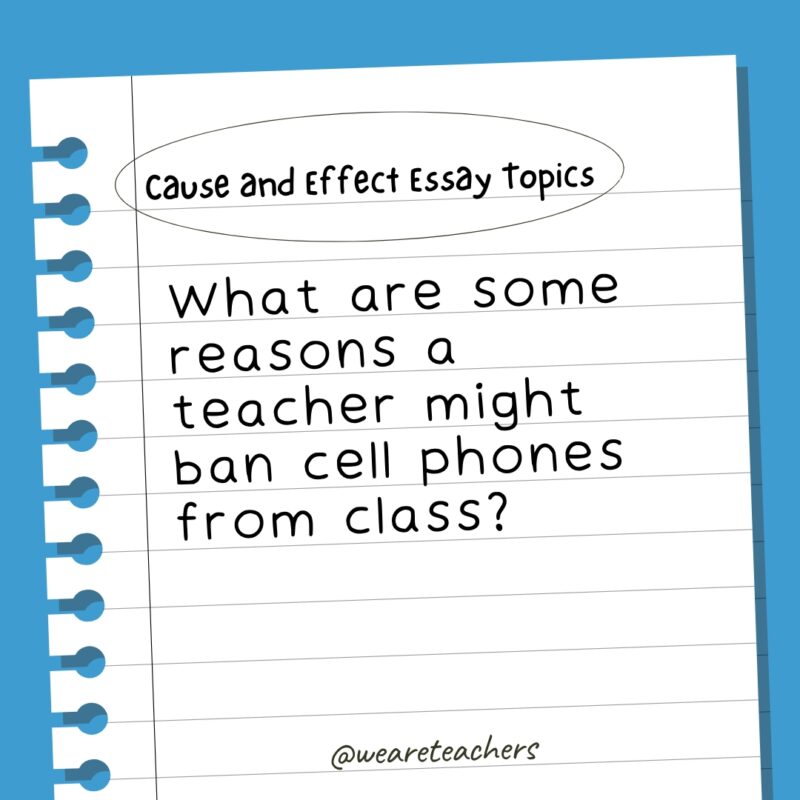
- What effects do cell phones have on sleep?
- What effects did the invention of the Internet have on technology?
- What were the origins of cyberbullying?
- What are the effects of tablet use on small children?
- How has online dating changed relationships?
- What makes some people less likely to use social media?
- What are the effects of social media on privacy?
- How does the rise of TikTok affect Facebook and Instagram?
- In what ways could social media lead to extremism?
- What is the impact of social media on the increasing popularity of plastic surgery and other enhancements?
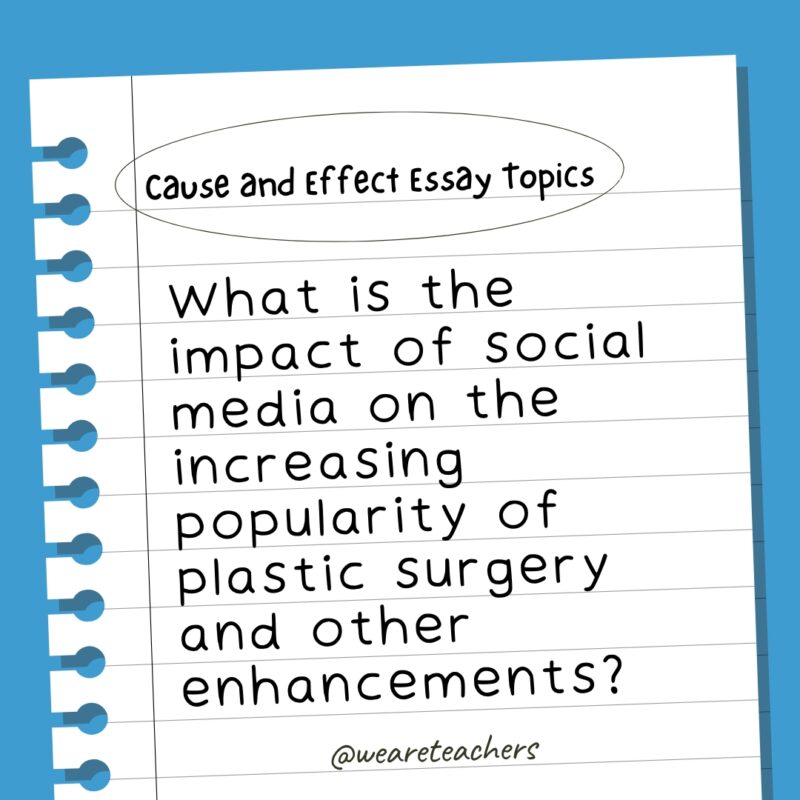
- What are some of the benefits of owning a smartphone and what are some of the drawbacks?
- What has been the impact of online shopping on brick-and-mortar stores?
- What has been the impact of smartphones on marriages and relationships?
- What are the causes and effects of texting while driving?
- What has the rise of “influencers” meant for Hollywood?
- In what ways have photo filters influenced young people’s self-esteem?
Culture and Social Issues Cause & Effect Essay Topics
- What are some of the reasons for substance abuse in young people?
- What are some of the effects of bullying?
- How does economic status affect the quality of health care?
- What are some of the causes of homelessness?
- Explain the effects of ignorance on discrimination.
- What are the impacts of death sentences on social justice?
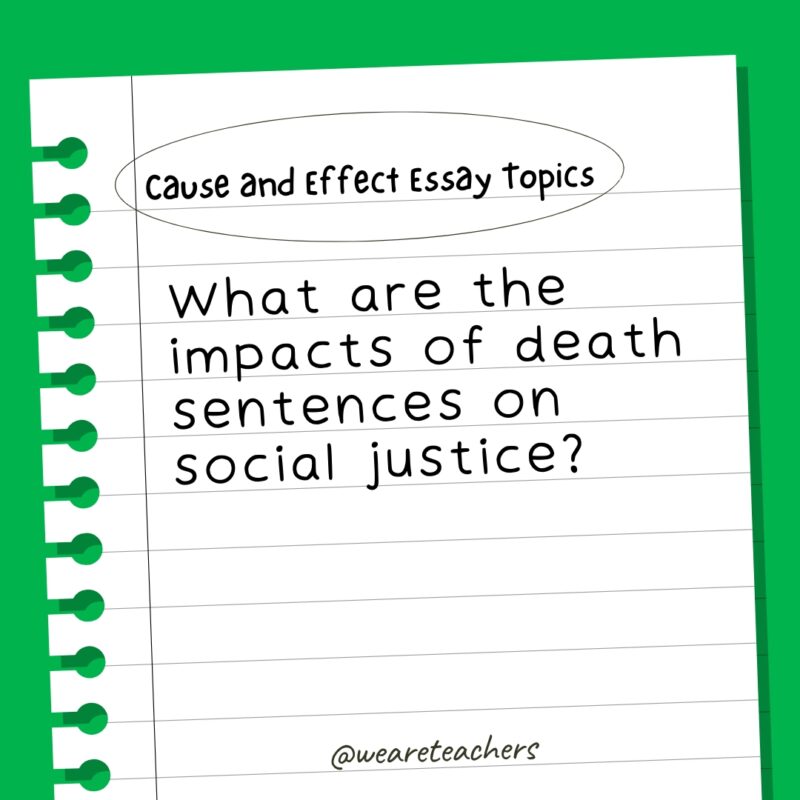
- How does financial success affect societal privilege?
- What effects does growing up poor have on children?
- In what ways does religion influence society?
- What are the effects of immigration on a host country?
- What are the effects of ageism on job opportunities?
- What is the impact of LGBTQ+ representation in TV and movies?
- What are the effects of school shootings on politics?
- How do school uniforms affect students?
- What are the impacts of high student debt?
- What are the impacts of body shaming on people?
- What were the lasting impacts of the AIDS epidemic on society?
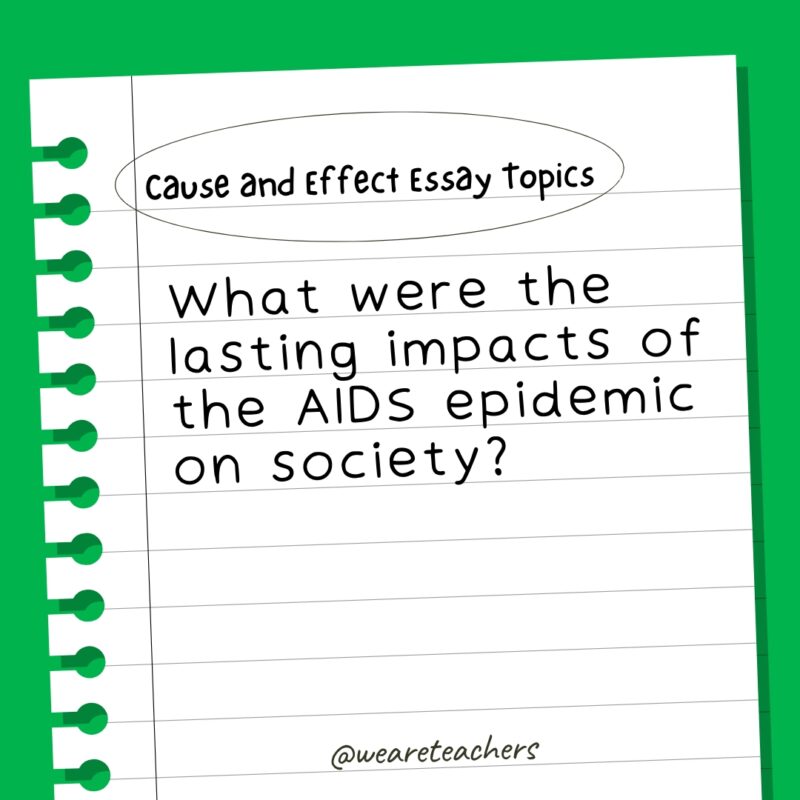
- What impact does banning abortion have in the United States?
- What has been the impact of marriage equality in the United States?
- What are the causes and effects of noise pollution?
- What are the causes and effects of inflation on the economy?
- What are the effects of TV shows on our behavior?
Sports Cause & Effect Essay Topics
- Examine the effects of exercise on mental health.
- What led to baseball being an iconic American sport?
- What drives people to participate in extreme sports?
- In what ways did globalization affect modern sports?
- What were the effects of doping on amateur and professional sports?
- Select a sport and write about the historical factors that led to the popularization of that sport.
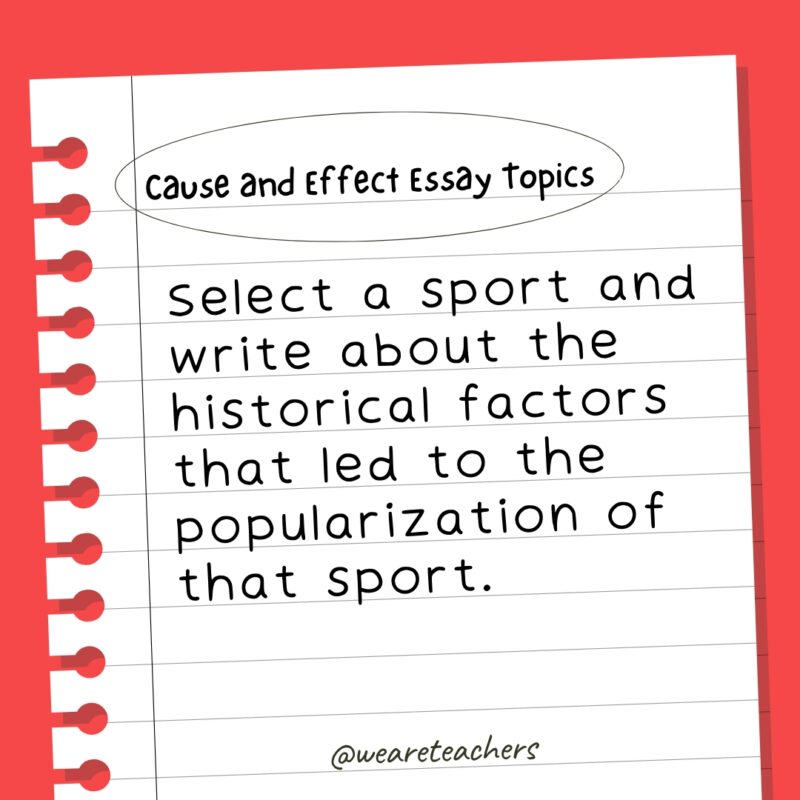
- Describe the ways in which youth sports influence a child’s development.
- What were the driving forces behind the first Olympics?
- How can team sports help develop social skills?
- How have e-sports changed the sporting landscape?
- In what ways do race biases influence sports?
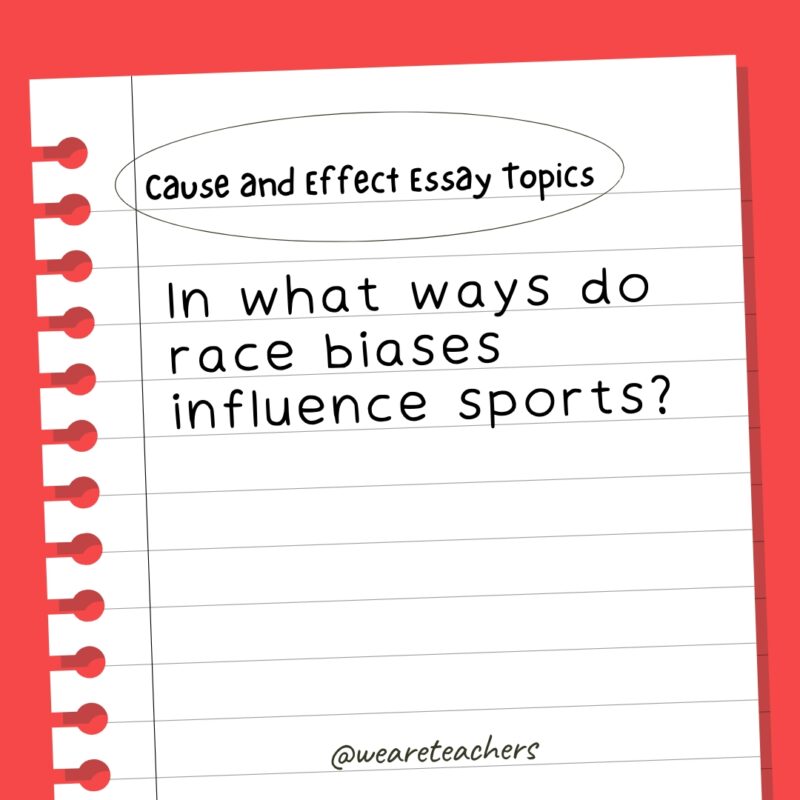
- What are the effects of regular workouts on immunity?
- How does participating in sports affect leadership skills?
- In what ways can sports lead to character development?
- What effect does famous athletes’ social commentary have on their fans?
History Cause & Effect Essay Topics
- What are the effects of the war in Syria on the United States?
- What have been the lasting effects of the Civil Rights Movement?
- What were the causes and effects of the attack on Pearl Harbor?
- What led up to the Berlin Wall being torn down and what effects did that have?
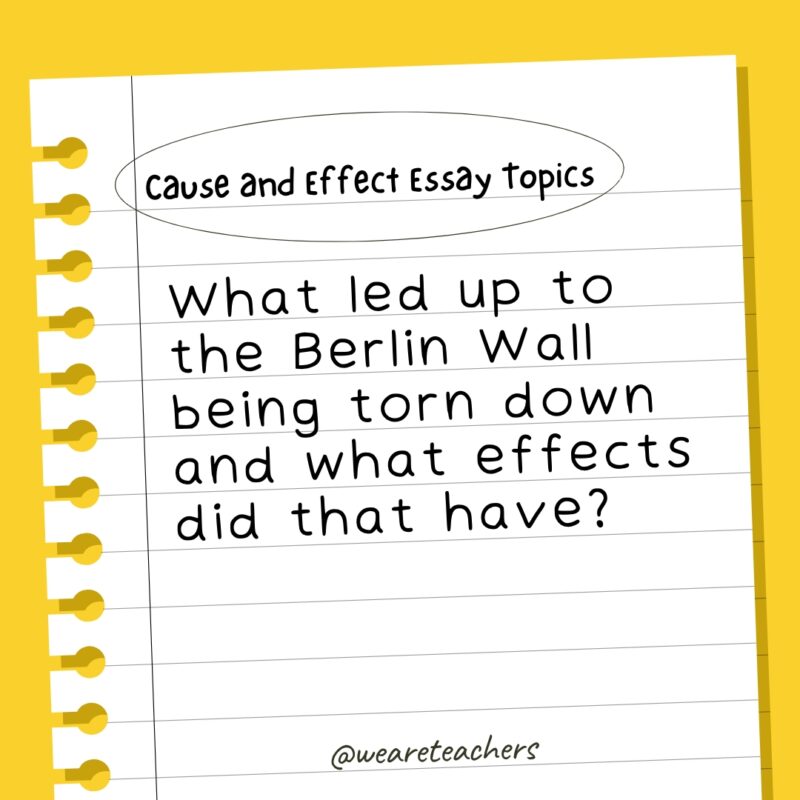
- What lasting impact did 9/11 have on modern American society?
- What were the causes of the Salem Witch Trials?
- What was the cultural impact of the Spanish-American War?
- How has globalization led to modern-day slavery?
- What events led to the fall of the Roman Empire?
- What were the impacts of the Great Depression on women’s employment?
- How did cartels come into existence? What effect have they had on the United States and Mexico?
- What were the causes and effects of the Women’s Liberation Movement?
- Give an example of colonialism in history and name the resulting impact to the affected society.
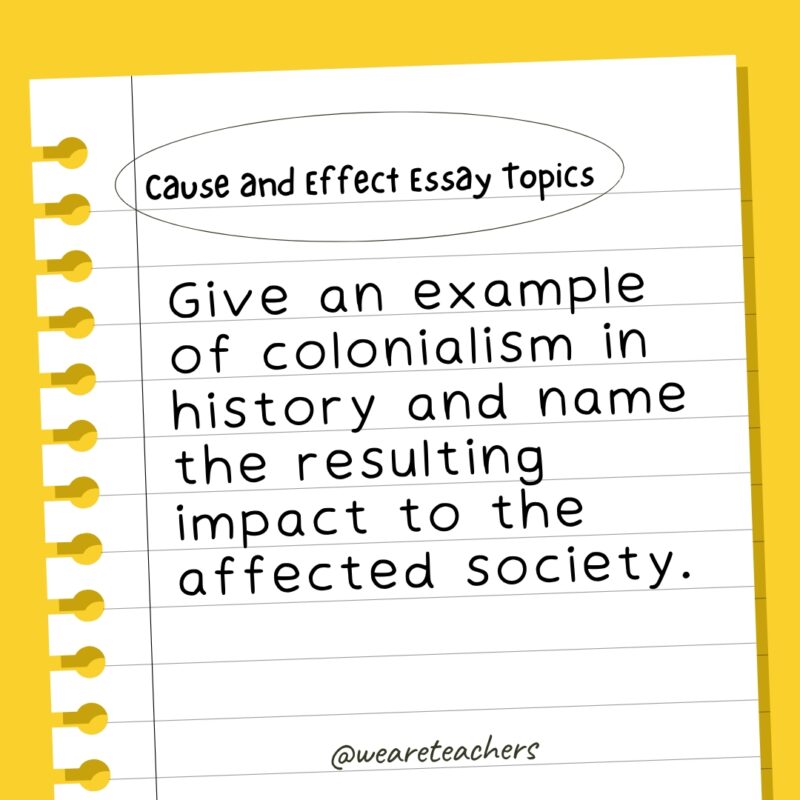
- What led to the rise of ISIS and what has the impact been on international security?
- What factors led to the Titanic’s sinking?
- What were the causes and effects of the Vietnam War?
- Choose an American president. What led him to become president and what were the effects of his presidency?
Mental Health Cause & Effect Essay Topics
- How can stress affect the immune system?
- How does social anxiety affect young people?
- How can high academic expectations lead to depression?
- What are the effects of divorce on young people?
- How does service in the armed forces lead to post-traumatic stress disorder?
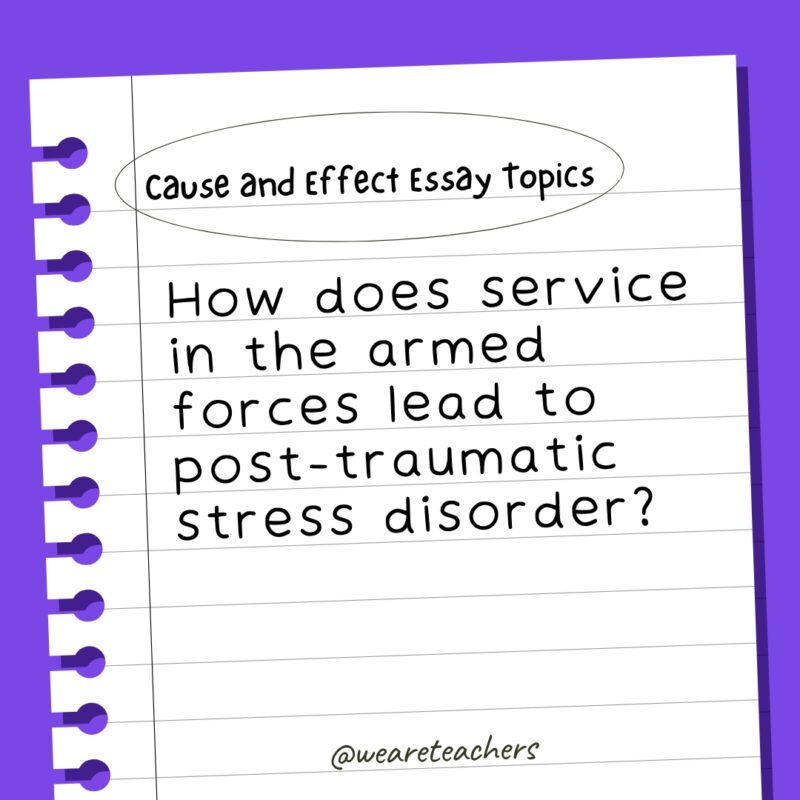
- What are the effects of mindfulness on mental health?
- Describe the ways in which the COVID-19 pandemic has impacted mental health.
- How does childhood trauma impact childhood development?
- What impact does witnessing violence have on mental health?
- What is behind increasingly high levels of anxiety in modern American society?
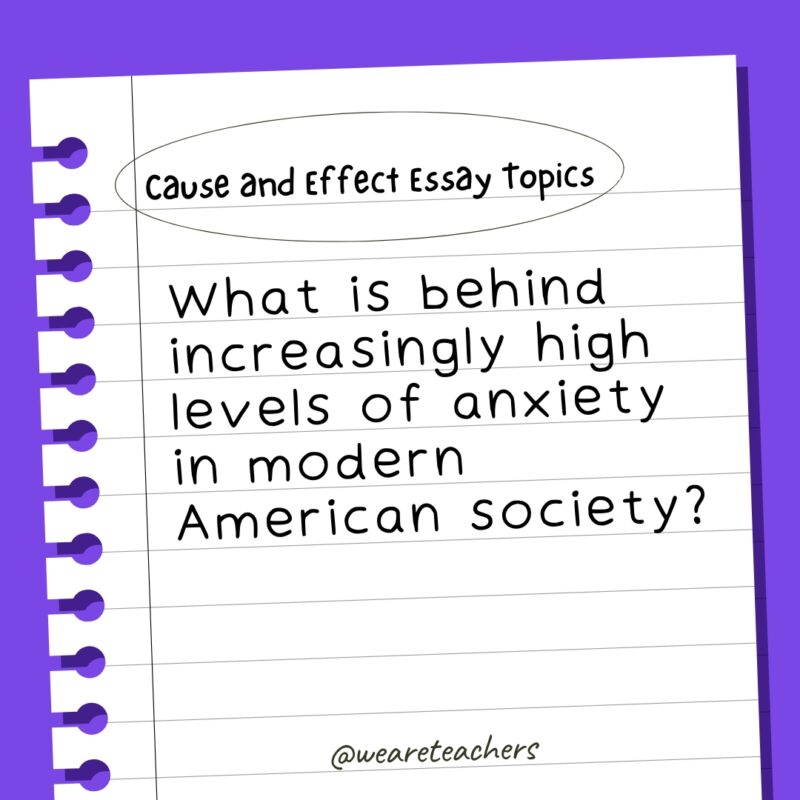
- What are the causes and effects of panic attacks?
- What are the causes and consequences of high stress in the workplace?
- What are some of the causes of insomnia and in what ways does it affect mental health?
- What is the impact of staying home for an extended period of time?
Current Events Cause & Effect Essay Topics
- Choose a local public education campaign. What are the effects of that campaign?
- What are the causes and effects of migration?
- What are the causes and effects of terrorist attacks?
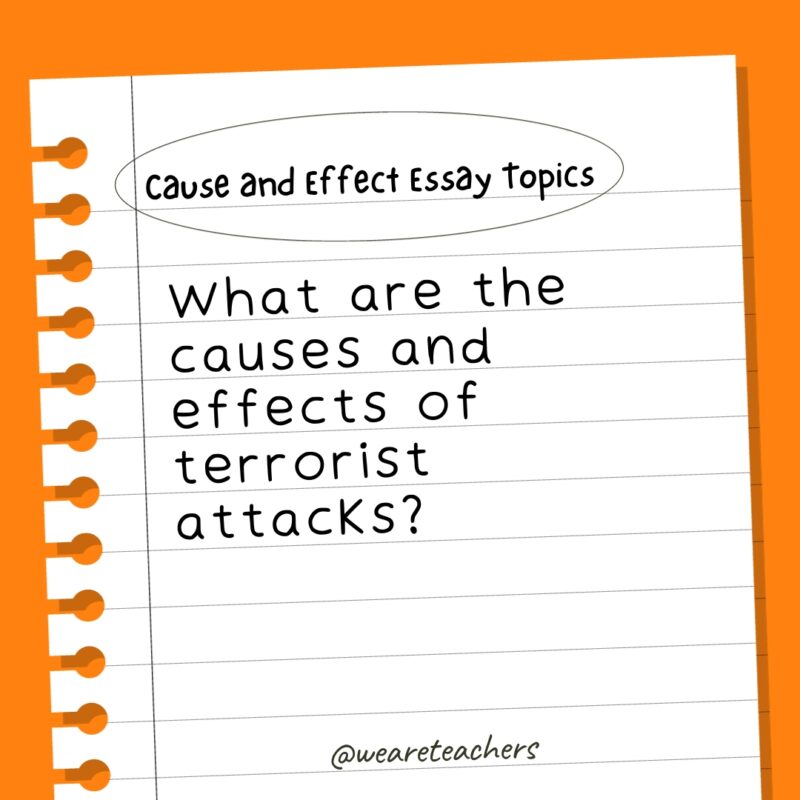
- What are the effects of legalizing genetic engineering research?
- How do low voting rates impact elections and government?
- What is the effect of raising the minimum wage?
- What are the effects of globalization on society?
- How does gerrymandering affect election outcomes?
- What are the causes and effects of police brutality?
- What are the causes and effects of political polarization?
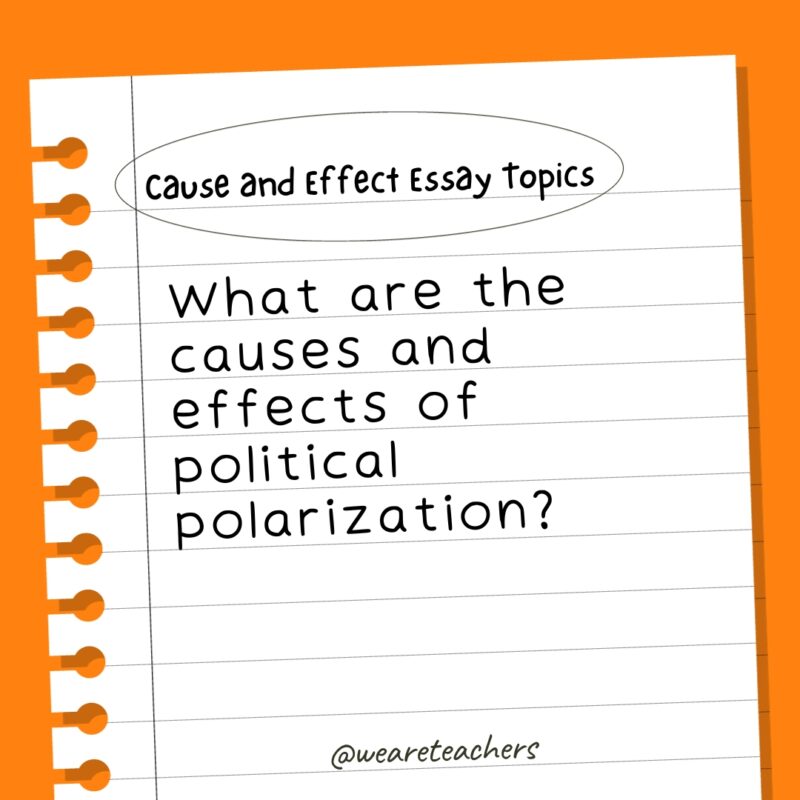
- What are the causes and effects of fake news?
- What are the effects of global war on citizens?
- What is the effect of international aid on poverty or health?
- Why do some countries have nuclear weapons, and what does this mean for other countries?
Education Cause & Effect Essay Topics
- What are the effects of teacher quality on student success?
- What are the causes and effects of student loan debt?
- What are the causes and effects of low graduation rates?
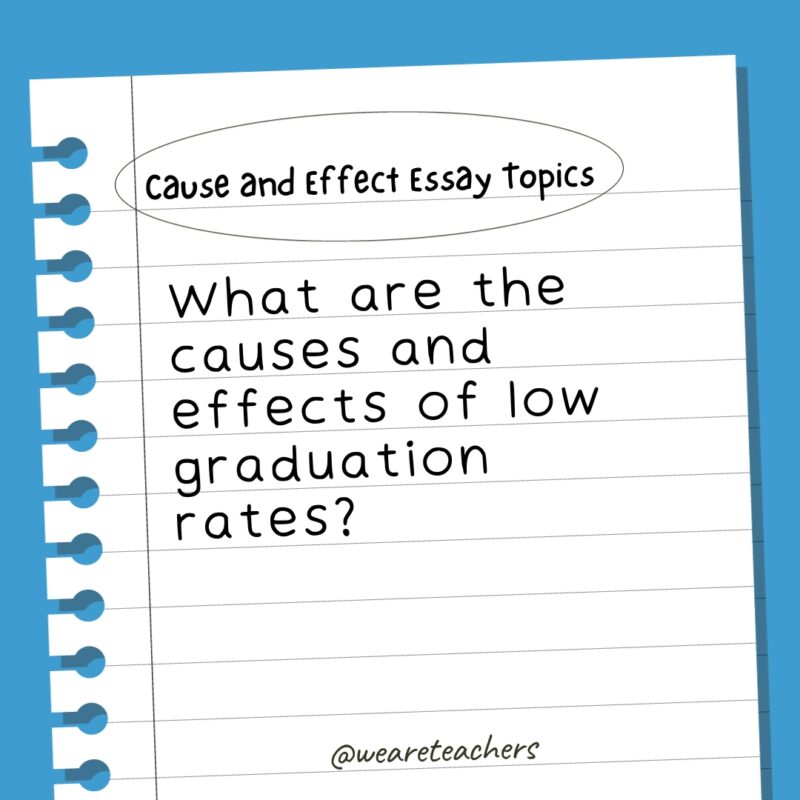
- What are the effects of assigning homework?
- What are the causes and effects of school funding disparities?
- What are the causes and effects of the digital divide in education?
- What is the effect of AI on education?
- What are the causes and effects of student burnout?
- Should students be required to study a foreign language in school, and what are the effects of learning a foreign language?
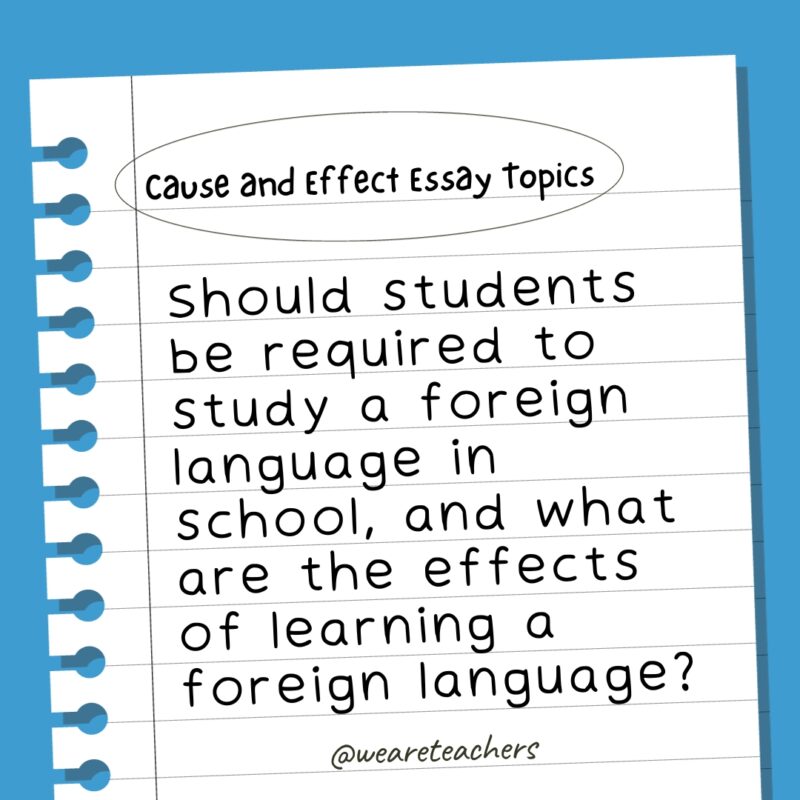
- What effect has the COVID pandemic had on education?
- What are the effects of same-sex classrooms or schools?
What are your best cause-and-effect essay topics for students? Come exchange ideas in the We Are Teachers HELPLINE group on Facebook.
Plus, check out our list of interesting persuasive essay topics for kids and teens..
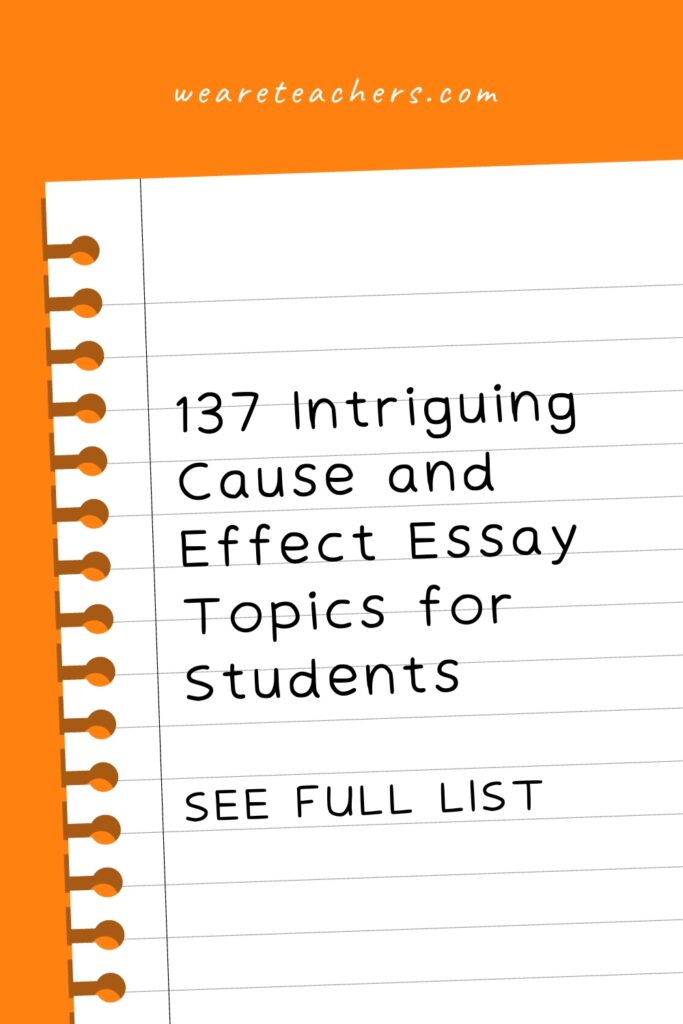
You Might Also Like

80 Intriguing Compare and Contrast Essay Topics for Kids and Teens
Android vs. iPhone? Capitalism vs. communism? Hot dog vs. taco? Continue Reading
Copyright © 2024. All rights reserved. 5335 Gate Parkway, Jacksonville, FL 32256
Persepolis: The Story of a Childhood
By marjane satrapi, persepolis: the story of a childhood essay questions.
How would you describe Marjane's interaction with Western culture?
Though she is born and raised for much of her life in Tehran, Marjane Satrapi is as much a product of Western culture as of Middle Eastern culture. Her parents both ascribe to Western political viewpoints and are not reluctant to let their daughter indulge in Western popular culture. One of the major reasons that Marjane is sent to Europe at the novel's end is because her parents feel as though she can no longer sustain the Western style of education that her parents want for her.
Whom do you think is described as the bigger enemy in the novel -- the Shah or the Islamic regime that takes control after the Shah?
Both the Shah and the Islamic fundamentalist regime are characterized as bad rulers of the Iranian people and it is difficult to say which was worse for the Iranian people. Satrapi seems to say that each regime is one side of the same coin. The Shah was brutal to his people, imprisoning many of the political dissidents, in his attempt to maintain power and to serve Western interests. The Islamic regime used the same brutality for the same reasons in order to propagate a pure Islamic state.
Discuss the theme of matriarchy in Persepolis .
Satrapi's novel is written from a feminist perspective, and thus the matriarchal side of her family features prominently in the story. Marjane's grandmother, as represented by her strength in caring for her children and her wisdom of peace and forgiveness, is the novel's chief matriarch. The end of the novel is a poignant scene in which Marjane falls into her grandmother's bosom and is sent out into the world with the mantle of matriarch now upon her.
Do you think that Marjane's father was a "resigned" individual, as Marjane claims in the novel?
Marjane has a complex view of her father throughout the novel. In many instances, one can see how she truly looked up to her father for holding controversial political views and for risking his safety in protests to overthrow the Shah. Marjane also sees her father has having the personality of "resignation," something she calls a Persian trait. He adamantly proclaims that he will not fight against Iran in the war and Marjane is disappointed that her father is not a tortured political hero as were Siamak and Mohsen.
How does the social class of Marjane's family conflict with their political views?
Marjane's family is a member of Iran's middle class. Her father has a good job as an engineer and they are able to keep a maid for the house, drive nice cars, take vacations, and give their daughter an excellent education. This privilege would seem to conflict with their political views, however. The family maintains a long familial heritage as leftist political activists. Many of Marjane's family members were imprisoned or killed for their beliefs. This dissonance between political belief and practice is a central tension of Marjane's childhood.
Discuss the symbolism of jewels and jewelry throughout the novel.
In several scenes of the novel, jewels represent the feminine. They are precious objects of great value. However, they are also easily bought and sold, as in the case of Mali and her family. Mali's jewels are sold in order for the family to survive their great loss in the Iraqi bombings. At the same time, Mali's life is seen as devalued by the other women Tehran because she is now a refugee. The loss of value of such beautiful, rare objects is mirrored in the devaluing of female identity under the Islamic regime.
In the novel's first scene, Marjane shows a photo of her elementary school class. She, however, is cut out of the picture. Why does Satrapi begin the novel with this imagery?
Persepolis can be read as one young girl's journey to find her own identity in the war torn, repressive Middle Eastern culture in which she grows up. By beginning the novel with this scene of a school photo, Satrapi is representing the fact that her Western self (the perspective from which she writes) is only half of her identity. The other half of her identity is found in Iran, a country that literally and figuratively attempts to hide away the identities of its women. Marjane's full identity, therefore, cannot be fully understood as long as a repressive fundamentalist spirit rules the country.
Some critics of the novel have claimed that Satrapi's view of Iran is too one-sided. Why or why not do you believe this is true?
Satrapi has been criticized for writing Persepolis from a Western perspective. In these critic's estimation, Marjane is as much a product of Western culture - Western education, Western politics, Western popular culture - as she is a part of her Middle Eastern milieu. This leads Satrapi to be overly critical of all who would ascribe to conservative Islamic practice. Her viewpoint, thus, correlates all conservative Muslims with the brutality of the Iranian fundamentalist regime. This criticism can be seen as unfair, however, if one reads Satrapi's novel chiefly as a political novel and not as a commentary on religion.
What symbolism does Satrapi give to cigarettes in the novel?
For Satrapi, a cigarette is first a symbol of adulthood and the freedom and independence that comes with being able to smoke. Marjane secretly sneaks away to her basement hideout to smoke a cigarette that she had stolen from her uncle. This, she claims, is her first act of adult independence. Her Uncle Tehar's smoking habit, however, represents the fact that both smoking and adulthood come with serious problems and consequences. Tehar is emotionally torn by his decision to send his son away to Holland while he is physically torn from the damage that smoking has done to his body.
Why does Satrapi think that the Islamic regime was able to gain control of Iran after the 1979 Revolution?
Through the characters of her father and uncle, Satrapi explains that the Revolution had been the product of a vocal minority while the majority of Iranians needed some kind of symbol to guide them and lead them. This allowed the Islamic religious leaders to take control of the country. Satrapi blames this on the people's lack of education. The people have faith only in religion, not in political ideals. Satrapi's uncle believes in the novel that the religious leaders will have no interest in leading the nation, yet this proves not to be the case.

Persepolis: The Story of a Childhood Questions and Answers
The Question and Answer section for Persepolis: The Story of a Childhood is a great resource to ask questions, find answers, and discuss the novel.
“The Veil”: How was education affected by the new regime? Why?
Check this out below.
https://www.gradesaver.com/persepolis-the-story-of-a-childhood/study-guide/summary-introduction-the-veil-and-the-bicycle
Persepolis is a graphic novel. Why do you think Satrapi chose this genre to tell her story?
As a graphic novel, it purposefully rejects the Islamic tenet that there should be no iconic representations of the faith. It boldly denounces the brutality of the regime and calls into question the legitimacy of its rule. The book challenges the...
. Why did Marji’s family continue to hold parties despite the danger?
The Satrapis hold a party to celebrate Marjane’s aunt and the birth of her child. The parties are necessary because “without them it wouldn’t be psychologically bearable....”
Study Guide for Persepolis: The Story of a Childhood
Persepolis: The Story of a Childhood study guide contains a biography of Marjane Satrapi, quiz questions, major themes, characters, and a full summary and analysis.
- About Persepolis: The Story of a Childhood
- Persepolis: The Story of a Childhood Summary
- Character List
Essays for Persepolis: The Story of a Childhood
Persepolis: The Story of a Childhood essays are academic essays for citation. These papers were written primarily by students and provide critical analysis of Persepolis: The Story of a Childhood by Marjane Satrapi.
- Unconventional Autobiographies: Arabesques and Persepolis
- The Gray Area Dialogue: An Analysis of Western Perspective in Satrapi’s Persepolis
- Persepolis: A Bildungsroman
- Nationalism in the Questionable Legitimization of Conflict in Satrapi’s Persepolis
- Persepolis and Martyrdom
Lesson Plan for Persepolis: The Story of a Childhood
- About the Author
- Study Objectives
- Common Core Standards
- Introduction to Persepolis: The Story of a Childhood
- Relationship to Other Books
- Bringing in Technology
- Notes to the Teacher
- Related Links
- Persepolis: The Story of a Childhood Bibliography
Wikipedia Entries for Persepolis: The Story of a Childhood
- Introduction
- Plot summary
- Character list
- Genre and style
Home — Essay Samples — Geography & Travel — Travel and Tourism Industry — The History of Moscow City
The History of Moscow City
- Categories: Russia Travel and Tourism Industry
About this sample

Words: 614 |
Published: Feb 12, 2019
Words: 614 | Page: 1 | 4 min read

Cite this Essay
Let us write you an essay from scratch
- 450+ experts on 30 subjects ready to help
- Custom essay delivered in as few as 3 hours
Get high-quality help

Dr. Heisenberg
Verified writer
- Expert in: Geography & Travel

+ 120 experts online
By clicking “Check Writers’ Offers”, you agree to our terms of service and privacy policy . We’ll occasionally send you promo and account related email
No need to pay just yet!
Related Essays
13 pages / 6011 words
5 pages / 2488 words
1 pages / 657 words
4 pages / 1910 words
Remember! This is just a sample.
You can get your custom paper by one of our expert writers.
121 writers online
Still can’t find what you need?
Browse our vast selection of original essay samples, each expertly formatted and styled
Related Essays on Travel and Tourism Industry
The ethics in the hospitality industry play a pivotal role in shaping the reputation and success of businesses within this sector. Ethics encompass the principles and values that guide behavior, decision-making, and interactions [...]
Travelling is a topic that has been debated for centuries, with some arguing that it is a waste of time and money, while others believe that it is an essential part of life. In this essay, I will argue that travelling is not [...]
Travelling has always been an exhilarating experience for me, and my recent trip to Rome was no exception. The ancient city, with its rich history and breathtaking architecture, left a lasting impression on me. It was a journey [...]
Traveling by air has become increasingly popular in recent years, with millions of people taking to the skies for both domestic and international travel. One of the key components of air travel is the purchase of flight tickets, [...]
When planning a business trip all aspects and decisions rely heavily on the budget set by the company for the trip. Once Sandfords have confirmed the location careful consideration should be used to choose the travel method and [...]
Tourism is an action of worldwide imperativeness and importance as it is a major force in the economy (Cooper et al. 2008). Tourism has undeniably developed as one of the most significant economic and social phenomena of the [...]
Related Topics
By clicking “Send”, you agree to our Terms of service and Privacy statement . We will occasionally send you account related emails.
Where do you want us to send this sample?
By clicking “Continue”, you agree to our terms of service and privacy policy.
Be careful. This essay is not unique
This essay was donated by a student and is likely to have been used and submitted before
Download this Sample
Free samples may contain mistakes and not unique parts
Sorry, we could not paraphrase this essay. Our professional writers can rewrite it and get you a unique paper.
Please check your inbox.
We can write you a custom essay that will follow your exact instructions and meet the deadlines. Let's fix your grades together!
Get Your Personalized Essay in 3 Hours or Less!
We use cookies to personalyze your web-site experience. By continuing we’ll assume you board with our cookie policy .
- Instructions Followed To The Letter
- Deadlines Met At Every Stage
- Unique And Plagiarism Free

- All Articles
- Books & Reviews
- Anthologies
- Audio Content
- Author Directory
- This Day in History
- War in Ukraine
- Israeli-Palestinian Conflict
- Artificial Intelligence
- Climate Change
- Biden Administration
- Geopolitics
- Benjamin Netanyahu
- Vladimir Putin
- Volodymyr Zelensky
- Nationalism
- Authoritarianism
- Propaganda & Disinformation
- West Africa
- North Korea
- Middle East
- United States
- View All Regions
Article Types
- Capsule Reviews
- Review Essays
- Ask the Experts
- Reading Lists
- Newsletters
- Customer Service
- Frequently Asked Questions
- Subscriber Resources
- Group Subscriptions
- Gift a Subscription

What Russia Wants in the Middle East
Moscow seeks to exploit instability but avoid escalation, by hanna notte.
Since Hamas’s October 7 attack on Israel, Russia has enjoyed watching the deteriorating situation in the Middle East preoccupy its main adversary, the United States. On April 13, however, Moscow grew concerned when, in retaliation for an attack on the Damascus consulate of Iran, its growing ally, Tehran launched more than 300 missiles and drones at Israel. Although that attack was effectively neutralized by antimissile defenses and coordinated support from the United States and Arab and Western partners, Israel responded six days later with a strike on an S-300 long-range air defense system in Isfahan, a city deep within Iran. When calibrating their actions, both Israel and Iran signaled that they were keen to avoid sliding into war. Yet by directly targeting each other on their own soil, the two longtime foes suggested that the unwritten rules of engagement between them have changed, making it harder for each to gauge the other’s actions and intentions and limit the risk of escalation. This has worried Russia, which has been walking a fine line between undermining U.S. strength in the region and not becoming overly committed and does not want to see a wider war in the Middle East.
Of course, mounting tensions between Iran and Israel could have advantages for Moscow. For one thing, further escalation in the Middle East would almost certainly divert Washington’s attention and supplies from Ukraine , where Russia is currently on the offensive. This dynamic was already apparent in the immediate aftermath of October 7, when the Biden administration sent additional Patriot batteries to the Middle East, drawing from a limited stock of systems that Kyiv was desperately seeking. In April, in anticipation of Iran’s retaliatory strike against Israel, the United States moved more military assets to the region to assist Israel’s defense. Then, in June, amid growing tensions between Israel and Hezbollah, Washington dispatched ships and U.S. Marines to the region. Further escalation would demand a commitment of additional U.S. resources, which the Kremlin can only welcome. Moreover, a Middle Eastern war would likely drive up oil prices, complicating the Biden administration’s efforts to tame fuel costs for the average American consumer months before the U.S. election. Russian President Vladimir Putin would surely rub his hands at President Joe Biden’s predicament.
Nonetheless, a wider war in the region would carry major risks for Moscow. If Israel began to fight Hezbollah or Iran, the Kremlin would have to contend with three dangerous outcomes: the entanglement of its ally Syria, a weakening of Iran’s capacity to supply Russia with weapons, and a complication of its relations with the Gulf Arab states and Iran. In a broader war, the United States should expect Moscow to give limited support to Israel’s adversaries and loudly blame Washington for the escalation, while avoiding direct military involvement. The United States should, therefore, use the diplomatic and military means at its disposal to ensure that tensions in the region do not spiral.
THE ROAD TO DAMASCUS
Even if Iran and Israel avoid direct confrontation, an escalation of Israel’s current conflict with Hezbollah would be risky for Russia. If Israel decides to invade Lebanon, it will likely result in widespread destruction, as well as an onslaught of Hezbollah missiles targeting Israel. Syria, where Russia maintains naval and air bases, could quickly become a secondary arena because the country is home to numerous Hezbollah positions and supply routes that Israel would strike. Along with its attack on the Iranian consulate in Damascus, Israel has already mounted strikes on Syrian infrastructure, including ammunitions depots, checkpoints, and headquarters, that enables Iran to funnel weapons to Hezbollah and other partners. In early July, an Israeli drone strike in Syria killed two Hezbollah fighters, prompting the group to fire rockets into the Golan Heights. Recently, reports have circulated in the Israeli media that Israel has warned Syrian President Bashar al-Assadnot to participate in the current Gaza war, even threatening to destroy his regime if further attacks are mounted from his country.
Israeli attacks on Syria would be likely to increase following the outbreak of a full-blown war with Hezbollah. Although the impact would be nowhere near as devastating as that which Lebanon can expect, it could still unnerve Russia. Ukraine may be a Russian foreign-policy priority in a class of its own, but Syria remains important to the Kremlin as an example of a conflict in which Russia came out on top, having stood by its ally. Syria is also of strategic value to Russia because it functions as a platform for projecting Moscow’s power into the eastern Mediterranean from a naval base in Tartus and an air base at Hmeymim that Russia upgraded and expanded before its invasion of Ukraine . The country is also a hub for transporting military resources to Libya and the Sahel in Africa, where Russia’s presence is expanding.
There are many possible Syrian targets. The Aleppo and Damascus airports are already in Israel’s cross hairs. But in the event of an Israeli war with Hezbollah, the Russian-operated Hmeymim air base in western Syria, which could be used as a transit point for Iranian weapons, could also become a target. Israel would probably alert Moscow before any such strikes since harming Russian personnel could escalate the conflict.
Still, Russia could see some of its assets hit. Moscow’s decision in January to step up its own air patrols along the disengagement line between Syria and the Golan Heights was probably meant as a warning to both Iran and Israel not to let Syria get swept into a regional maelstrom. In the event of increased Israeli attacks on Syria, Moscow would probably dial up its electronic jamming from Hmeymim to disrupt Israeli operations and allow the Syrians to use Russian air defense systems to engage Israeli fighter jets. Moscow would likely want to avoid creating the impression that its forces are directly fighting Israel, unless it believed its presence in Syria to be fundamentally threatened.
THE STOCKPILES MELT AWAY
If the Middle East explodes, Iran may also be drawn into the conflict. Before its retaliatory strike against Iran on April 19, Israel’s war cabinet reportedly mulled several options, including hits on strategic facilities including Revolutionary Guard bases or nuclear research facilities. Instead, Israel settled for a moderate response. Its leaders would surely be less restrained in the event of further escalation, and they have the capacity to inflict serious damage on Iran. This was shown when Israel targeted the facility in Isfahan, revealing the strength of Israeli intelligence assets and its ability to operate on Iranian soil. There can be little doubt that future attacks could be crippling.
Israeli strikes could conceivably target Iranian production facilities for drones in the Tehran and Isfahan regions, ballistic missiles in Tehran, Khojir, and Shahrud, or ammunition in Parchin and Isfahan. Facilities that produce critical components for weapons production, such as drone engines in Tehran and Qom and ballistic-missile solid rocket motors in Khojir and Shahrud, could also come under attack. Although such facilities are spread across the country, extensive strikes could, at least in the short term, affect Iranian weapons transfers to Russia in these categories.
A wider war in the Middle East would carry major risks for Moscow.
Depending on what Israel —or the United States, should it opt to join in—decided to attack in an escalated situation, Iran’s defense industry could come under serious strain. This would have consequences for Russia, which has relied on Iran for drones and other weaponry to fuel its war in Ukraine. Indeed, since the invasion of Ukraine in 2022, Moscow and Tehran have considerably expanded their military-technical cooperation, with Russia receiving various types of Iranian combat drones, artillery shells, small arms ammunition and glide bombs. In recognition of this dependence, Russia has begun domestic production of Iranian Shahed drones and has secured additional military supplies from North Korea. Although those changes may have lessened Russia’s reliance on the transfer of Iranian weapons systems somewhat, Moscow surely does not wish to see its partner’s defense industry decimated. For as long as it is fighting Ukraine, Russia will want to ensure that Tehran can help replenish its stocks while also partnering with Moscow in developing new kinds of drones.
Iran’s entry into the war would cause other problems for Moscow. Should Israel choose to attack Iran, Tehran would need to mobilize all its military capacity to hit back. Lacking an effective air force or air defenses, Iran would have to rely on its fleet of missiles and drones, severely curtailing what it could deliver to Russia. Even if Middle Eastern escalation were limited to fierce fighting between Israel and Iranian proxies, Tehran would need to replenish its partners’ arsenals, again giving it less leeway to support Moscow.
An Israeli-led campaign against Iran could also pose reputational risks for Russia. With the war in Ukraine its top priority, Moscow has neither the bandwidth nor the desire to come to Iran’s aid in the event of serious military conflict. In fact, Russia has always wanted to avoid getting into a war with Israel, let alone U.S. forces, in the Middle East. Should tensions spiral, Russia would not emerge as Iran’s knight in shining armor. It would talk loudly about U.S. aggression and might even increase its military support for Iran in the aftermath of an attack, but it would avoid entanglement. This inaction could dent Russia’s own reputation in the region and beyond. Over the medium term, an Iranian-Israeli war may also push Tehran, once it has recovered, to obtain a nuclear weapon—an outcome that Russia will not want to see, because of the risks associated with such a development.
WALK THE LINE
Regional escalation might also complicate Russia’s relationships with Iran and the Gulf Arab states. In recent years, the United Arab Emirates and Saudi Arabia have pursued a rapprochement with Iran, calculating that direct dialogue and economic ties are the best way to preserve regional stability. Although orchestrated without Russian input, this rapprochement has benefited Moscow. It has made it easier for the Kremlin to closely align itself with Iran and its partners and proxies, which are the region’s main anti-Western forces, while preserving its relations with the Arab states. Meanwhile, coordination with the Gulf states in OPEC+ has given Russia leverage over the oil market, and the UAE has emerged as a crucial conduit for Russian efforts to evade sanctions imposed in response to its invasion of Ukraine.
Russia’s relationships with the Gulf Arab states and with Iran have helped Moscow make the case for broadening the membership of the BRICS, a bloc founded by Brazil, Russia, India, and China in 2009 that South Africa joined the following year. In 2023, the group was expanded to include Iran and the UAE along with Egypt and Ethiopia, furthering the Kremlin’s efforts to assemble a growing alignment of non-Western powers. It is much easier for Russia to maintain these relationships when the Persian Gulf is harmonious, rather than engage in a zero-sum game in which its dealings with one side in a conflict will irk the other. No wonder, then, that Russian diplomats were happy when the king of Bahrain, Hamad bin Isa al-Khalifa, promised in May during a visit to Moscow that his country, long a Western-facing Gulf Arab state, would normalize relations with Iran.
Military escalation between Israel and Iran could complicate Russia’s plans. Although several Arab states helped Israel fend off Iran’s April 13 air attack, they played down their role and have signaled a clear interest in sustaining their rapprochement with Iran. They oppose any further Israeli offensive actions against Iran or its proxies, fearing that regional war would jeopardize their economic agendas and further outrage domestic constituencies that have denounced the devastation in Gaza. But as much as the Gulf Arab states do not wish to see their détente with Iran collapse, escalation between Israel and Iran or its proxies could bring strikes on their soil. Targets may include U.S. military facilities or strategic assets such as oil facilities, which the Houthis have previously targeted in Saudi Arabia and the UAE. No matter who fired the first shot, Gulf Arab states would likely blame Israeli Prime Minister Benjamin Netanyahu’s government for any escalation. The resulting erosion of Israel’s recent rapprochement with the UAE and other Gulf governments would please the Kremlin, which has viewed with apprehension the formation of an anti-Iranian bloc uniting Israel and the Gulf Arab states under U.S. auspices. Still, regional escalation carries risks for the Arab-Iranian détente as well—and, by extension, for Russia.
In April, Iran and Israel appeared to be stepping toward the brink but then managed to restrain themselves. If they go further next time—or should Israel decide that the moment is ripe to take on Hezbollah—the ensuing escalation would threaten all parties, including Moscow, which would be forced to decide whether to respond or to remain on the sidelines. Russia’s ability to shape outcomes, however, would be more limited than that of the United States. This is because Russia’s military capabilities are already stretched and its leverage over the belligerents is negligible. When push comes to shove, Russia is likely to support Iran or Hezbollah through electronic warfare or by funneling weapons to its partners that are not needed for the Ukraine campaign. Moscow is unlikely to directly engage militarily. It will undoubtedly blame Washington for any escalation. But in view of what Russia stands to lose in Syria, in Iran, and elsewhere in the region, it is far from guaranteed that Moscow would emerge triumphant from such a war. If the Middle East explodes, it will hurt Russia’s enemies—but it will hurt Russia, too.
Because Russia’s overarching priority is its global confrontation with the United States over Ukraine, Putin should have no interest in getting drawn into a full-blown Middle Eastern war that he cannot control. Tensions in the region help Russia in its drive to undermine global order, but only for as long as they can be managed. Moscow is benefiting from the current war in Gaza and is happy to see the United States’ reputation decline for what is widely perceived as unjust support for Israel. That is also why Russia has shown little interest in calming present tensions.
If the Middle East explodes, it will hurt Russia’s enemies—but it will hurt Russia, too.
During the past nine months—arguably the most consequential for the Middle East in decades—Russia has been on the diplomatic sidelines. Whereas the most senior U.S. officials have tirelessly shuttled between regional capitals, Russia has focused its efforts on the UN Security Council. There, Moscow has repeatedly criticized Washington for failing to support cease-fire resolutions. When the United States recently proposed its own resolution for a three-phase cease-fire, Russia abstained, citing a lack of details, but refrained from vetoing the text, which had received backing from the Arab world. Russia has enjoyed watching the United States contend with the twin predicament of being both the most hated player in the region and the one that many powers look to for salvation—a role that Washington cannot or will not perform. As long as U.S. policy remains mired in this mess, Russia has no reason to jeopardize its own interests by fueling more regional trouble.
If war breaks out between Israel and Hezbollah, Russia has two plausible options: it could do nothing, or it could increase its support for Israel’s adversaries while avoiding direct military entanglement. Sitting on the sidelines is not credible, which means that the likeliest outcome is that Moscow would support Iran’s proxies through a combination of weapons supplies and nonmilitary support. With its increasingly sophisticated capabilities, Russia could step up its electronic warfare from Syria by jamming the guidance systems of Israeli weaponry. It could also funnel more weapons to Hezbollah in Lebanon or the Houthis in Yemen, which would be consistent with its current strategy. In January, Hezbollah struck Israel’s Mount Meron air traffic control base with what appeared to be Russian-made guided antitank missiles; according to U.S. officials, Moscow recently considered transferring cruise missiles to the Houthis. Military constraints resulting from Russia’s Ukraine campaign and political prudence mandated by its relations with the Gulf Arab states should keep the Kremlin from getting too deeply involved with Iran’s proxies.
Washington should be clear-eyed about Russia’s outlook on a wider war in the Middle East. Moscow has no interest in U.S. diplomacy achieving calm and stability, but it also does not want a regional conflagration. Therefore, although Russia will not be a constructive force helping the United States defuse tensions, it will not egg on Iran or its proxies to wage full-blown war against Israel. If there is a war, Washington should expect limited support from Russia for Israel’s adversaries, and should work to undermine or neutralize it where it can. Warnings from Washington that Moscow should not involve itself are unlikely to succeed. Instead, the United States should encourage its Gulf Arab partners to exert quiet pressure on Russia not to transfer missiles and other weaponry to Iranian proxies, making clear the risks of doing so. The United States should also beef up its own defenses, encourage its Israeli partners to respect Russian redlines in Syria, and, above all, step up its diplomatic efforts to ensure that, should a Hezbollah-Israeli war break out, it can be quickly contained.
You are reading a free article.
Subscribe to foreign affairs to get unlimited access..
- Paywall-free reading of new articles and over a century of archives
- Unlock access to iOS/Android apps to save editions for offline reading
- Six issues a year in print and online, plus audio articles
- HANNA NOTTE is Director of the Eurasia Nonproliferation Program at the James Martin Center for Nonproliferation Studies and a Nonresident Senior Associate with the Europe, Russia, and Eurasia Program at the Center for Strategic and International Studies.
- More By Hanna Notte
Most-Read Articles
Orders of disorder.
Who Disbanded Iraq’s Army and De-Baathified Its Bureaucracy?
Garrett M. Graff
The return of peace through strength.
Making the Case for Trump’s Foreign Policy
Robert C. O’Brien
What the lebanese people really think of hezbollah.
And How Their Views Might Shape the Next Phase of Conflict in the Middle East
MaryClare Roche and Michael Robbins
Putin’s new war economy.
Why Soviet-Style Military Spending—and State Intervention—Won’t Save Russia
Andrei Kolesnikov
Recommended articles, the dangerous push for israeli-saudi normalization.
Without a Real Path to a Palestinian State, a Deal Will Destabilize the Middle East
Maria Fantappie and Vali Nasr
Stay informed., thank you for signing up. stay tuned for the latest from foreign affairs ..
Advertisement
Supported by
Russia Sentences U.S. Journalist in Absentia for Ukraine War Comments
Masha Gessen was found guilty of spreading “false information” and sentenced to eight years in prison over remarks made in 2022 about the Russian military.
- Share full article

By Neil MacFarquhar
A Moscow court on Monday sentenced in absentia Masha Gessen, the Russian-born American journalist, author and New York Times staff member, to eight years in prison over comments they made about atrocities that the Russian military has been accused of committing in Ukraine.
Russian law enforcement officials charged Mx. Gessen, who lives in the United States and uses the pronoun they, in August over a 2022 interview they gave to Yuri Dud, a popular online Russian journalist. They were put on a wanted list in December.
In the interview — which was broadcast on YouTube and has been viewed more than 6.6 million times — they discussed the apparent massacre by Russian forces of hundreds of people in the eastern Ukrainian city of Bucha and others. The corpses of at least 400 civilians were found in Bucha after Russian forces retreated from the city.
Russia’s Basmanny District Court found Mx. Gessen guilty of spreading “false information” about the Russian military, an all-too-common tactic against critics as the Kremlin uses the courts to suppress any information about the war that diverges from the official version. Russia has accused Ukraine and its Western allies of staging the Bucha massacre.
It took the court only minutes to issue a conviction, Mx. Gessen said in an interview on Monday. They join various other writers wanted by Russia, including Boris Akunin and Dmitry Glukhovsky, a popular science-fiction writer.
Two American journalists have been detained in Russia.
Evan Gershkovich, a reporter for The Wall Street Journal, has been imprisoned since March 2023 and is on trial on espionage charges, which the U.S. government, his employer and he all vehemently deny. And Alsu Kurmasheva , a Russian American editor for the U.S. government-funded Radio Free Europe/Radio Liberty, has been detained since December on charges of spreading “false information,” as well as failing to register as a foreign agent. She and her employer have called the accusations baseless.
We are having trouble retrieving the article content.
Please enable JavaScript in your browser settings.
Thank you for your patience while we verify access. If you are in Reader mode please exit and log into your Times account, or subscribe for all of The Times.
Thank you for your patience while we verify access.
Already a subscriber? Log in .
Want all of The Times? Subscribe .
- Singapore’s foreign admirers see only the stuff they like
It is a Rorschach nation

Your browser does not support the <audio> element.
A CENTURY AGO a Swiss psychoanalyst called Hermann Rorschach pioneered a diagnostic test that would eventually become famous worldwide. Patients were shown a series of inkblot patterns on cards, and asked to describe what they saw. The result was thought to reveal much about their state of mind.
For fans of foreign affairs and students of public policy, here is another kind of Rorschach test: ask them about Singapore, and see what they say. The tiny nation’s undoubted success is analysed endlessly. But the lessons drawn from it tend to reveal more about the viewer than they do about the city-state.
Observers from wildly different countries all agree that there is much to like in a country notable for its sparkling infrastructure, low crime, high social cohesion and sky-high gdp of $88,000 per person. Liz Truss, a former (and disastrous) British prime minister, has argued that her country should have become “Singapore on steroids” after leaving the European Union; by that she had in mind an economic model of very low taxes and ultra-light regulation. The respective presidents of Rwanda and El Salvador, Paul Kagame and Nayib Bukele—the one a stern authoritarian and the other a Trump-style populist disdainful of democratic checks on power—handily see proof in illiberal Singapore that Western-style democracy is not required to reach first-world prosperity.
Singapore is an easy place on which to project desires and even fantasies. An independent country since 1965, it has grown rich in a single lifetime. The universal use of English makes it superficially easy to engage with. Like a business-school case study, foreigners get the impression that they can take a pick-and-mix approach to Singapore’s practices and innovations, a view they would not extend to nations with older histories and institutions.
Yet the individual preoccupations of the country’s international fans clash with Singapore’s more complex realities. For leaders in the developing world who love Singapore’s tough-on-crime approach, its clean courts and low corruption are often far less of a priority. Those such as Ms Truss who fantasise about the city’s light regulation ignore its active industrial policies, with much government support in chosen sectors. Small-state fans rarely mention the city’s successful system of mass public housing—crucial to understanding why Singapore’s population has remained content to host an international financial hub, even as property prices have shot up. Selective blindness prevails.
In truth Singapore’s odd hybrid political system defies categorisation. It is pointedly not a liberal democracy (this newspaper’s sister organisation, the Economist Intelligence Unit, places Singapore above Bangladesh but below Indonesia in a league table that ranks countries according to the strength of their democracies). Yet it sits alongside much freer places in corruption rankings maintained by Transparency International, an NGO . Though its global fans come largely from the political right, Singapore’s housing policies have a socialist tinge. Joseph Stiglitz, a left-leaning economist and Nobel laureate, has said nice things about its low inequality. Meanwhile, its commitment to policing speech which might offend racial or religious sensibilities goes beyond what even the wokest Westerners might advocate. For overseas admirers who use Singapore as a rhetorical cudgel, digging too deep into the government’s actual methods only ruins the effect.
It is hard to imagine that foreign leaders and bureaucrats will ever cease travelling to the city in search of lessons (among them, once, a Fuzhou city Communist Party secretary called Xi Jinping). But how many of the country’s policies can other nations really borrow? Some Singaporean policymakers say that even Singapore would struggle today to replicate its earlier successes, achieved when strong-arm rulers simply laid down what must be done. Today, despite the sanitised politics, many voices contend over key policies.
In the future, popular visions of Singapore might only grow more detached from facts on the ground. Lawrence Wong, the country’s new prime minister, has acknowledged new pressures from ordinary Singaporeans, such as a desire for less immigration and more welfare. He says that the government is ready to re-examine all of its assumptions, and advocates a softer, more consultative form of leadership. Students of Singapore could soon find that the inkblot itself begins to change shape. ■
Explore more
This article appeared in the Asia section of the print edition under the headline “The Rorschach nation”
Asia July 13th 2024
The world’s next food superpower, narendra modi cuddles up to vladimir putin in moscow, social-media populists have arrived in japan.

From the July 13th 2024 edition
Discover stories from this section and more in the list of contents
More from Asia

A small-town mayor shakes up Tokyo’s election

Farming in India should be about profits and productivity, not poverty

India’s prime minister visited amid fresh Russian atrocities in Ukraine
Demand for uranium is booming. Who is benefiting?
One Central Asian country stands out above the rest
Why is Thai health care so good?
The country could become a model for the region
Why many young Asians are no longer studying history
One city-state is bucking the regional trend

IMAGES
VIDEO
COMMENTS
Journaling is a time-honored pedagogical tradition that helps kids in elementary school engage with their budding vocabularies, penmanship, and reading comprehension. Plus, it gets them to use their imaginations and process their own thoughts and feelings. (In other words, journal writing rocks.) Now…. That doesn't mean any ol' journaling ...
Good writing prompts get students' creative juices flowing, help them write more freely, and ease any anxiety they may feel about the writing process.To integrate writing prompts into your lessons, ask students to choose one writing prompt each day or week. To make the activity more challenging, encourage them to write without stopping for at least five minutes, increasing the number of ...
Share a favorite joke. writing prompts for elementary. Explain what you think makes school enjoyable. Draft a letter to a child in another state or country describing your state. Write a review of your favorite movie. Describe the place where you feel the safest. Tell how to play your favorite recess game. How does responding to writing prompts ...
Read&Write is a digital literacy tool that helps students express their thoughts and opinions through words. Your students can use tools in Read&Write like Check It, Talk and Type, and the text and picture dictionaries to help develop their confidence in writing. Use these writing prompts for younger learners to give elementary students story ...
Elementary Secondary Recommended. 70+ Fascinating Informative Essay Topics for Kids and Teens. Tell them what you know. Read More. The Big List of Essay Topics for High School (120+ Ideas!) Ideas to inspire every young writer! Read More. 100 Thought-Provoking Argumentative Writing Prompts for Kids and Teens.
75 Elementary Writing Prompts for Kids. Check out these fun writing prompts and use them as inspiration this school year for your 1st to 5th-grade students. The best thing to do on a snow day. If I was in the circus, I would _______. The best place to play in my neighborhood. When I grow up.
Diversify Topics: Rotate between different types of prompts. This variety keeps students engaged and helps develop a range of skills. Consider Current Events and Relevance: Incorporate prompts related to recent events or topics for opinion writing relevant to students' lives. This makes the writing exercise more engaging and relatable.
To organize the daybook, direct young writers to leave the first three pages blank and number and date each entry—adding these entries to a table of contents that they create as they work so they can return to specific entries later. 50 Writing Prompts for All Grade Levels. pdf 144.59 KB.
Use this listing of fun, persuasive essay topics and writing ideas for elementary kids in your classroom today. 15 Persuasive Writing Topics for Kids. We should not have a school dress code. Pets should be allowed in school. School break times should be longer. There should be no homework. The school day should be shorter.
What superpower do you wish you had? Basic Writing Prompts For Elementary Students. by TeachThought Staff. What do you like more, reading or writing? Why? If you could have any superpower, what would it be and why? Describe your perfect day. What is your favorite outdoor activity and why? If you could go on a trip anywhere worldwide, where ...
We've collected 57 writing prompts for students of various ages, from elementary school through high school. From spooky story writing prompts to debating how to improve schools, this article has writing prompts that will appeal to all students. Tips for Using These Writing Prompts. What's the best way to use these creative writing prompts for ...
40 Descriptive Writing Prompts for Elementary School. 1. Describe a place you always wanted to visit. 2. Describe the most beautiful scene in nature that you can imagine. 3. Describe a kitchen that you have seen or would love to see. 4. Describe the ocean.
These inspiring elementary writing prompts will spark the interest of young writers in any grade. ... Essays; 100 Elementary Writing Prompts Kids Will Love By Kate Miller-Wilson, B.A. , Staff Writer . ... A new kid comes to school and says he is from 1900…. Advertisement
100 Thought-Provoking Argumentative Writing Prompts for Kids and Teens. Practice making well-reasoned arguments using research and facts. Writing a strong argumentative essay teaches students to make a case for their own point of view without relying on emotion or passion. These argumentative essay topics provide options for kids of all ages ...
49 Opinion Writing Prompts for Students. One of the most common essay types is the opinion, or persuasive, essay. In an opinion essay, the writer states a point of view, then provides facts and reasoned arguments to support that viewpoint. The goal of the essay is to convince the reader to share the writer's opinion.
The expository essay should contain a main idea (thesis), supporting details (with transitions) and a conclusion in a logical fashion. Be sure to check your work for grammatical correctness as well! Happy writing! 1. Write about what you think the world will be like in 100 years. 2. We are learning all the time.
Not only opinion topics are great for finding out what your child or student likes when it comes to a certain topic but also get them to think outside of the box and get creative when writing. Writing prompts logical, critical, and exploratory thinking. These opinion writing prompts are also great for middle schoolers, high schoolers, and ...
Engaging and relevant argumentative essay topics for students in upper elementary and middle school. This list of 20 argument writing prompts is appropriate for students in 5th - 8th grades.
Middle School. 137 Intriguing Cause & Effect Essay Topics for Students. Teach critical thinking, logic, and the art of persuasion. By We Are Teachers Staff. Nov 29, 2023. Cause-and-effect essays aren't just a way to help students strengthen their writing skills. They'll also learn critical thinking, logic, and the art of persuasion.
In the novel's first scene, Marjane shows a photo of her elementary school class. She, however, is cut out of the picture. ... Wang, Bella ed. "Persepolis: The Story of a Childhood Essay Questions". GradeSaver, 20 August 2010 Web. Cite this page. Study Guide Navigation; About Persepolis: The Story of a Childhood; Persepolis: The Story of a ...
The History of Moscow City. Moscow is the capital and largest city of Russia as well as the. It is also the 4th largest city in the world, and is the first in size among all European cities. Moscow was founded in 1147 by Yuri Dolgoruki, a prince of the region. The town lay on important land and water trade routes, and it grew and prospered.
High school: Traditional American and British literature canon, modern novels, short stories, poems and essays 9th grade through 12th grade Library Elementary: Kindergarten through 5th grade Middle school: 6th grade through 8th grade High school: 9th grade through 12th grade District-wide: Kindergarten through 12th grade. Math. Elementary ...
Best Writing Prompts for Elementary Students— Whether your elementary students are still honing their writing skills or they've been writing book reports and short stories for years, there's no such thing as too much practice!Journaling is one of the most effective ways for kids to become better, more confident writers—and in turn, better, more confident students.
Since Hamas's October 7 attack on Israel, Russia has enjoyed watching the deteriorating situation in the Middle East preoccupy its main adversary, the United States. On April 13, however, Moscow grew concerned when, in retaliation for an attack on the Damascus consulate of Iran, its growing ally ...
Moscow Elementary School is a highly rated, public school located in MOSCOW, PA. It has 591 students in grades K-3 with a student-teacher ratio of 13 to 1. According to state test scores, 62% of students are at least proficient in math and 77% in reading. Compare Moscow Elementary School to Other Schools. npsd.org. (570) 842-8464. 851 CHURCH ST.
Masha A. Gessen was found guilty of spreading "false information" and sentenced to eight years in prison over remarks made in 2022 about the Russian military.
Like a business-school case study, foreigners get the impression that they can take a pick-and-mix approach to Singapore's practices and innovations, a view they would not extend to nations with ...